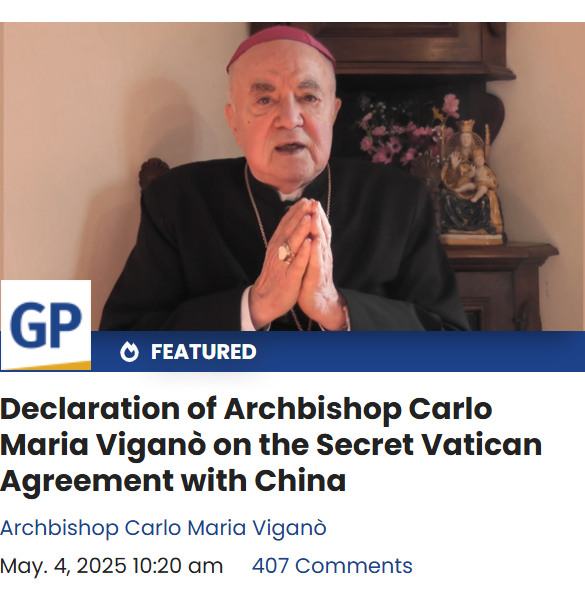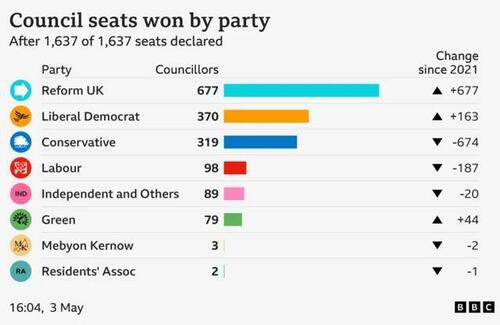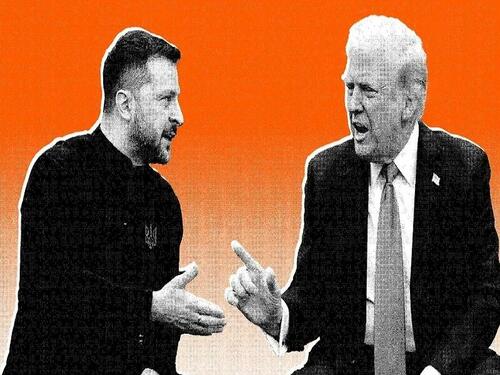To live without faith, without a patrimony to defend, without a steady struggle for truth – that is not living, but existing.
Distinction Matter - Subscribed Feeds
-
Site: RT - News
Right-wing candidate George Simion is leading in the polls with more than 40% of the votes
George Simion, a critic of the EU who has been banned from entering Ukraine, won the first round of the rerun of the Romanian presidential election on Sunday.
With more than 95% of the ballots counted, Simion, the leader of the right-wing Alliance for the Union of Romanians (AUR), received 40.52% of the votes, according to the news website G4 Media.
Former Senator Crin Antonescu and Bucharest Mayor Nicusor Dan, both known for their pro-EU views, each received a little over 20%.
“This is not just an electoral victory, it is a victory of Romanian dignity. It is the victory of those who have not lost hope, of those who still believe in Romania, a free, respected, sovereign country,” Simion said after the exit polls were published, according to Reuters.
The vote took place after Romania’s Constitutional Court annulled the results of the election held in November, in which independent right-wing candidate Calin Georgescu received 23% of the votes.
The court cited “irregularities” in Georgescu’s campaign, as well as intelligence reports claiming that the Kremlin had meddled in the election. Moscow rejected these claims of interference at the time as “anti-Russia hysteria.”
In March, the Central Electoral Bureau barred Georgescu from running again, citing his alleged “anti-democratic” and “extremist” stance, as well as a failure to comply with electoral procedures.
On Sunday, Georgescu and Simion arrived at a polling station together. “We are here with a single mission: to restore constitutional order and democracy,” Simion told reporters.
Read more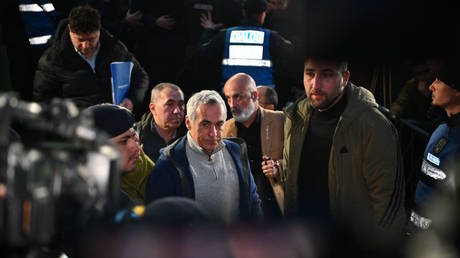 Romanian police launch anti-Georgescu crackdown (VIDEOS)
Romanian police launch anti-Georgescu crackdown (VIDEOS)
In November 2024, the Security Service of Ukraine (SBU) said that Simion had been blacklisted for his “systematic anti-Ukrainian activities, which contradict the national interests of Ukraine and violate its state sovereignty and territorial integrity.”
Simion argued that he was targeted because of his “promotion of historical truth” among the Romanian minority in western Ukraine. He was also banned from entering neighboring Moldova, which he labeled “an artificial country” that “will never join the European Union.”
Simion has opposed the delivery of weapons to Kiev. “We will not send military aid to Ukraine, and that doesn’t make us pro-Russian,” he told reporters last year.
He has also criticized EU bureaucrats. “The EU is a remarkable project that brought peace to Europe after centuries of war, but Brussels has become a greedy and corrupt bubble,” according to the politician.
-
Site: RT - News
Right-wing candidate George Simion is leading in the polls with more than 40% of the votes
George Simion, a critic of the EU who has been banned from entering Ukraine, won the first round of the rerun of the Romanian presidential election on Sunday.
With more than 95% of the ballots counted, Simion, the leader of the right-wing Alliance for the Union of Romanians (AUR), received 40.52% of the votes, according to the news website G4 Media.
Former Senator Crin Antonescu and Bucharest Mayor Nicusor Dan, both known for their pro-EU views, each received a little over 20%.
“This is not just an electoral victory, it is a victory of Romanian dignity. It is the victory of those who have not lost hope, of those who still believe in Romania, a free, respected, sovereign country,” Simion said after the exit polls were published, according to Reuters.
The vote took place after Romania’s Constitutional Court annulled the results of the election held in November, in which independent right-wing candidate Calin Georgescu received 23% of the votes.
The court cited “irregularities” in Georgescu’s campaign, as well as intelligence reports claiming that the Kremlin had meddled in the election. Moscow rejected these claims of interference at the time as “anti-Russia hysteria.”
In March, the Central Electoral Bureau barred Georgescu from running again, citing his alleged “anti-democratic” and “extremist” stance, as well as a failure to comply with electoral procedures.
On Sunday, Georgescu and Simion arrived at a polling station together. “We are here with a single mission: to restore constitutional order and democracy,” Simion told reporters.
Read more Romanian police launch anti-Georgescu crackdown (VIDEOS)
Romanian police launch anti-Georgescu crackdown (VIDEOS)
In November 2024, the Security Service of Ukraine (SBU) said that Simion had been blacklisted for his “systematic anti-Ukrainian activities, which contradict the national interests of Ukraine and violate its state sovereignty and territorial integrity.”
Simion argued that he was targeted because of his “promotion of historical truth” among the Romanian minority in western Ukraine. He was also banned from entering neighboring Moldova, which he labeled “an artificial country” that “will never join the European Union.”
Simion has opposed the delivery of weapons to Kiev. “We will not send military aid to Ukraine, and that doesn’t make us pro-Russian,” he told reporters last year.
He has also criticized EU bureaucrats. “The EU is a remarkable project that brought peace to Europe after centuries of war, but Brussels has become a greedy and corrupt bubble,” according to the politician.
-
Site: 4Christum
Italian Freemasons pay tribute to apostate Jorge Bergoglio
Francis the Beloved Son of Masonry, by Atila Sinke Guimaraes
Apostate Joe Biden joins Freemasonry the day before leaving US presidencyBergoglio is a member of the Masonic Rotary Club of Argentina since 1999
“Contra factum non valet argumentum” -
Site: RT - News
The Russian foreign minister told Islamabad that Moscow is ready to assist in mediating if both countries agree
Russian Foreign Minister Sergey Lavrov has discussed the escalation of tensions between Islamabad and New Delhi in a phone call with his Pakistani counterpart, Ishaq Dar, Russia’s Foreign Ministry said in a statement on Sunday.
Lavrov expressed Moscow’s willingness to support peaceful efforts to ease the tensions. “The Russian side emphasized its readiness to assist in the political resolution of the situation that arose after the April 22 terrorist attack in the Pahalgam area, if there is mutual interest from Islamabad and New Delhi,” the ministry said. The statement added that the call took place at Pakistan’s request.
On Saturday, Lavrov spoke to his Indian counterpart S. Jaishankar. According to a statement from the Russian Foreign Ministry, Lavrov urged “a settlement of disagreements between New Delhi and Islamabad by political and diplomatic means” on a bilateral basis in accordance with the provisions of the 1972 Simla Agreement and the 1999 Lahore Declaration, which are historical frameworks under which the two South Asian countries previously agreed to resolve disputes diplomatically.
Read more A decades-old deal is falling apart – and two nuclear neighbors are involved
A decades-old deal is falling apart – and two nuclear neighbors are involved
According to the Pakistani Foreign Ministry, during the call Dar rejected India’s “baseless allegations and inflammatory rhetoric against Pakistan” and condemned New Delhi’s “illegal move” to hold the water treaty in abeyance.”
The nuclear-armed neighbors have witnessed a sharp nosedive in already strained ties after a terrorist attack in southern Kashmir left 26 civilians dead. The terrorist attack occurred in the Baisaran Valley near Pahalgam in India’s Jammu and Kashmir union territory on April 22.
Following the attack, India took a series of measures against the neighboring country, including expelling some Pakistani diplomats, cancelling visas of Pakistani citizens, and closing the land border. It also suspended parts of the 1960 Indus Water Treaty that governs water sharing with Pakistan. On Saturday, New Delhi announced a set of further measures aimed at downgrading already severed trade ties with Pakistan.
Pakistan has responded with its own countermeasures and warned of further escalation. Islamabad last week claimed that it has “credible intelligence” that India intends to launch military action against it, and has said it is prepared to respond. The two countries have reportedly exchanged gunfire for ten consecutive nights along the Line of Control in Kashmir.
Read more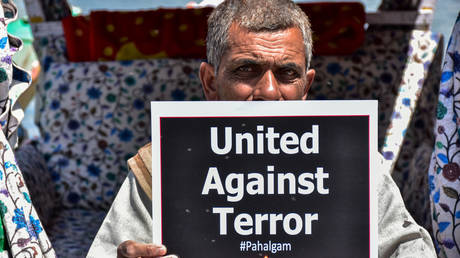 ‘Our hearts bleed today’: How terrorist attack shook fragile stability in Kashmir
‘Our hearts bleed today’: How terrorist attack shook fragile stability in Kashmir
India has accused Pakistan of supporting the militant group allegedly behind the Kashmir attack, reiterating its long-standing claim that Islamabad supports cross-border terrorism and uses terrorism as a tool.
Islamabad has denied India’s claims. Pakistani Defense Minister Khawaja Asif has claimed that his country itself was a victim of terrorism in the region stemming from the policies of Western governments, particularly the US, tracing back decades, starting with the Soviet-Afghanistan war in the late 1980s. The minister admitted his country had previously done “dirty work” by “training and indoctrinating jihadists on behalf of the West.” He, however, called it a mistake and said Pakistan now bears the consequences of previous policies.
-
Site: 4Christum
Cardinal Zen: Pope Francis is Backing a “Fake Church” in China
 Marcelo Sorondo Believes China Is "Best Implementer" Of Catholic Social Doctrine
Marcelo Sorondo Believes China Is "Best Implementer" Of Catholic Social Doctrine"Rome will lose the faith and become the seat of the Antichrist. The Church will be in eclipse." - Our Lady of La Salette
-
Site: PeakProsperityChina's gold ETF inflows surged, driven by tariff fears, but prices dipped as trade talks progressed. Will gold ease further if U.S.-China tensions cool?
-
Site: Unam Sanctam Catholicam
It is very disappointing that many Catholics are apparently disposing themselves to doubt the validity of the upcoming conclave before it has even begun. These doubts seem to be drivem by an overly legalistic readings of John Paul II's Universi dominici gregis, the late pontiff's 1996 Apostolic Constitution on choosing the successor of St. Peter.
The most common concern people raise is the issue of Cardinals agreeing to cast their votes for a given candidate. It is commonly asserted that Universi dominic gregis forbids the Cardinal electors from talking together and agreeing on who to support. There are three points from the Apostolic Constitution that are typically raised in this respect: paragraph 79, which forbids Cardinals from laying plans regarding a pope's succession during his lifetime; paragraph 81 which forbids Cardinals from entering into binding pacts to create voting blocs; and paragraph 82 which forbids Cardinals from promising future courses of action in exchange for support during the Conclave. Based on these proscriptions, people assume that if any sort of consulation between Cardinals has taken place to obtain the election of a given candidate, that candidate's election would be ipso facto invalid according to Universi dominici gregis.People generally read way too much into these paragraphs, taking them to forbid much more than they actually do. We will consider each in turn.Paragraph 79: No Plotting for the Pope's Succession
Paragraph 79 of Universi dominici gregis forbids Cardinals from establishing plans for the pope's succession while the pope is yet alive. The text states:Confirming the prescriptions of my Predecessors, I likewise forbid anyone, even if he is a Cardinal, during the Pope's lifetime and without having consulted him, to make plans concerning the election of his successor, or to promise votes, or to make decisions in this regard in private gatherings.It should be clear that this pertains to formal planning, not to informal discussion. It prevents Cardinals from gathering together in private and saying, "Okay, when Pope X dies, we need to get Cardinal Y to succeed him. To accomplish this, we are all going to follow this plan and commit our votes to Y and here's how we plan to persuade the others to go along." It does not forbid Cardinals from saying, "I have always admired Cardinal Y; I think he would make a good pope," and conversing about his merits. To "make plans," "promise votes," or "make decisions" implies a resolution of action akin to a plot or conspiracy, not mere conversation.Paragraph 81: No Commitments to Support a Given CandidateParagraph 81 goes on to stipulate that each Cardinal elector must be completely free from compulsion when he casts his ballot and therefore forbids any sort of agreement that imposes a commitment upon them. The Apostolic Constitution reads:The Cardinal electors shall further abstain from any form of pact, agreement, promise or other commitment of any kind which could oblige them to give or deny their vote to a person or persons. If this were in fact done, even under oath, I decree that such a commitment shall be null and void and that no one shall be bound to observe it; and I hereby impose the penalty of excommunication latae sententiae upon those who violate this prohibition. It is not my intention however to forbid, during the period in which the See is vacant, the exchange of views concerning the election.This is the text most often cited to cast doubt on the validity of the conclave, as it is clear that Cardinals do indeed talk amongst themselves and come to agreements about whom they will throw their support behind. And that they have always done so. It should be noted, however, that 81 does not forbid the Cardinals from agreeing about a candidate, but only from creating binding pacts. The text says that they may not form any "pact, agreement, promise or other commitment of any kind" if that commitmnet "could oblige them to give or deny their vote." This paragraph is not about the issue of agreement, but rather on maintaining the freedom of the electors. In other words, Cardinal electors are allowed to agree that a given candidate is the best choice for the papacy, so long as that agreement is not of such a nature to give rise to a binding obligation to give or deny their vote. It does not prohibit a free consensus of opinion free of obligation.I likewise forbid the Cardinals before the election to enter into any stipulations, committing themselves of common accord to a certain course of action should one of them be elevated to the Pontificate. These promises too, should any in fact be made, even under oath, I also declare null and void.
Paragraph 82: Campaigning for the Papacy
The following paragraph essentially forbids Cardinals from campaigning for the papacy by means of promising certain actions subsequent to their election:You will notice the Cardinals are forbidden from acting in concert in pursuit of "a certain course of action should one of them be elevated to the Pontificate." This prohibits a Cardinal from saying, "If you elect me, I promise I will do such and such." The purpose of this is to prevent the Conclave from degenerating into something like an American election, where politicians sell themselves to the voters in exchange for goodies promised after election. It does not, however, forbid the Cardinals from coming to a voluntary consensus about a candidate without any reference to future papal acts. In other words, they can freely resolve on a common course of action so long as there is no specific quid pro quo.
Null and VoidBut what if the Cardinals do violate any of these prohibitions? What if they do enter into a formal pact to choose a successor before the pope dies, or a Cardinal does offer promises in exchange for votes? What if the St. Gallen Mafia came to some sort of formal arrangement to secure the election of Bergoglio while Benedict was still alive? Or what if something like that happens in 2025? Is that Cardinal's election null and void therby?
No. You will notice, for example, that paragraph 82 is careful to point out that, while promises made to gain votes are considered null and void, the validity of the election is not. Universi dominici gregis says, "These promises too, should any in fact be made, even under oath, I also declare null and void." It is the promises that are rendered null, not the election made in light of said promises.
We see elsewhere that John Paul II was careful to state that a papal election would not be nullified even under conditions of simony. Let's look at paragraph 78, which is quite extraordinary:If—God forbid—in the election of the Roman Pontiff the crime of simony were to be perpetrated, I decree and declare that all those guilty thereof shall incur excommunication latae sententiae. At the same time I remove the nullity or invalidity of the same simoniacal provision, in order that—as was already established by my Predecessors—the validity of the election of the Roman Pontiff may not for this reason be challenged.John Paul here clarifies that while one guilty of simony in the election of a Roman pontiff would incur excommunication latae sententiae, the simoniacal election itself would not be invalidated, so that "the validity of the election of the Roman Pontiff may not for this reason be challenged."The right to elect the Roman Pontiff belongs exclusively to the Cardinals of Holy Roman Church, with the exception of those who have reached their eightieth birthday before the day of the Roman Pontiff's death or the day when the Apostolic See becomes vacant...No Cardinal elector can be excluded from active or passive voice in the election of the Supreme Pontiff, for any reason or pretext (33, 35).If the grave ecclesiastical crime of simony would not invalidate the election of the pope, we may safely assume that neither would lesser offenses such as making pacts or discussing papal succession while the current pope lives.
We really need to let go of this idea that papal conclaves can be invalidated by what amount to procedural violations. Some will contest this based on Universi dominici gregis 76, which says:Should the election take place in a way other than that prescribed in the present Constitution, or should the conditions laid down here not be observed, the election is for this very reason null and void, without any need for a declaration on the matter; consequently, it confers no right on the one elected.This would seem to indicate that deviations from the text of Universi dominici gregis would render any subsequent papal election null. But the text is not meant to be read in such a legalistic way. There are a billion different eventualities that could cause an election to "take place in a way other than what is prescribed," but without nullifying the results. Here I will defer to Dr. Ed Peters on this question, who opines:Consider: UDG requires (among many, many things) the use of paper ballots with the words “Eligo in Summum Pontificem” across the top. Now suppose some, but only some, ballots read “Eligo in Summum Pontficem”, but this mistake is not noticed until after a winner is announced in the Sistine Chapel. Has the election taken place “in a way other than that prescribed”? Yes. Suppose the electors run out of paper ballots and start using card stock. Has the election taken place “in a way other than that prescribed”? Sure. Suppose some electors cannot spell a candidate’s name correctly and so either badly guess at its spelling or identify him by his city or country? Has the election taken place “in a way other than that prescribed”? Indeed. Suppose Rome is hit with a heat wave and the Sistine Chapel AC breaks down, so, to save aging electors dangerous misery (such as actually happened during the election of Benedict XIV), the afternoon ballots are shifted to take place in the morning. Has the election taken place “in a way other than that prescribed”? Certainly. A thousand variations on the ‘prescribed way’ of electing seem possible, some trivial (like typos on a ballot), others gravely sinful (like simony), such that, in some cases at least, the words in UDG 76, “in a way other than that prescribed”, could not reasonably connote in Church law everything they could well connote in common parlance. ("Francis was never pope? Call me unpersuaded," Catholic World Report, Sept. 28, 2017)In the aftermath of the 2013 conclave, there were some arguing against the election of Pope Francis based on the fact that he was elected on a fifth ballot in a day when Universi dominici gregis limits the amount of ballots cast in one day to four. This is exactly the sort of thing Dr. Peters is talking about. These kinds of procedural deviations do not touch on the form and substance of the conclave and do not thereby render it invalid (I recommend you read the entirety of Dr. Peters' article, linked above, for further study).
The Number of Cardinal ElectorsToday we see people fretting about the number of Cardinal electors being 133 when Universi dominici gregis says they should not exceed 120. This, too, is a nothingburger....the universality of the Church is sufficiently expressed by the College of one hundred and twenty electors, made up of Cardinals coming from all parts of the world and from very different cultures. I therefore confirm that this is to be the maximum number of Cardinal electors.
For one thing, it is not easy to keep the number of Cardinal electors at or below 120, as cardinalatial offices need to be filled but no one can predict when a cardinal will die or resign. Popes create cardinals hoping to maintain the college at a general size, but cannot predict how death and resignations will affect this number. Both John Paul II and Benedict XVI created more Cardinal electors than 120. The only difference is that age and death reduced that number below 120 before the conclaves of 2005 and 2013, although this was mere happenstance. In the case of the 2025 conclave, we have over 120 Cardinal electors participating, and this too is happenstance.
One may notice a potential conflict in the text of Universi dominici gregis on this matter. On the one hand, the introduction of the text fixes the maximum amount of electors at 120. Here is the relevant text:This is reaffirmed in paragraph 33 as well, which says, "The maximum number of Cardinal electors must not exceed one hundred and twenty." Well and good. But, on the other hand, the document also says that every Cardinal under the age of eighty at the time of the sede vacante possesses the right to vote in the conclave:The problem should be evident. The document limits the number of Cardinal electors to 120 while also stating that no Cardinal elector can be excluded from voting, even if there are more than 120. To harmonize these provisions, the Church interprets the 120 rule loosely in light of the prerogatives of the Cardinal electors. In other words, which is more important, that the Cardinal electors exercise their millennium-old right to choose the Roman pontiff, or that we adhere to the arbitrary number of 120 set by Paul VI? Obviously the former. This is why the Roman pontiffs have seen fit to interpret this rule broadly, and hence John Paul, Benedict, and Francis all elevated the number of electors above 120, functionally amounting to ad hoc mitigation of the 120 rule. The 120 rule is essentially the debt ceiling of papal conclaves—yes it exists, but it can be raised at will.
Should doubts arise concerning the prescriptions contained in this Constitution, or concerning the manner of putting them into effect, I decree that all power of issuing a judgment in this regard belongs to the College of Cardinals, to which I grant the faculty of interpreting doubtful or controverted points. I also establish that should it be necessary to discuss these or other similar questions, except the act of election, it suffices that the majority of the Cardinals present should concur in the same opinion.
The Competency of the College of Cardinals
Perhaps you think I am taking liberties with my explanations. I am certainly no expert in this area, although what I have written has been informed by my own study of those who are much more knowledgeable on matters of law and precedent. If you are still unpersuaded, however, I would like to draw your attention to paragraph 5 of Universi dominic gregis, which is meant to be a catch-all for every potential issue that could be contested during a conclave:If there is any uncertainty as to any the legality or validity of anything relating to the conclave, it falls to the College of Cardinals to resolve the issue. If "it suffices that the majority of the Cardinals present should concur" on any controverted point, then the very fact that the College of Cardinals does not object to some irregularity—real or perceived—itself constitutes an acceptance of the validity of the conclave and its results.
It is, therefore, not possible to have a conclave wherein two thirds of the Cardinal electors select a pope who is accepted by the Sacred College but have that same election somehow invalidated due to a procedural technicality. -
Site: Fr. Z's BlogIn the older calendar, today is St. Monica’s Feast, also spelled Monnica, a Punic name. Monica was an inch away from becoming an alcoholic. (The story of her abusive husband has been told here before.) This is IMPORTANT. At the … Read More →
-
Site: Fr. Z's BlogWhen 06:00 arrived, up came the sun here in Rome. One minute ago as I write, which is 20:15, the sun officially set. The schedule for the Ave Maria Bell is still 20:30, though technically it should be more closely … Read More →
-
Site: Henrymakow.com
 (left, the Poles told their side of the story in a movie made in 2007)Communist Jews executed 20,000 Polish Catholic army officers in 1940.The thesis of my fourth collection Illuminati 4: War and Genocide is that Organized Jewry (Rothschilds) is controlled by Chabad, a satanic cult that is fulfilling Biblical Prophecy by instigating another world war to exterminate non-Satanists, including assimilated Jews. Trump, Putin and Netanyahu are members of Chabad and the major actors in this deadly charade.I forgot to mention Katyn Massacre, yet another example of the centuries-long vendetta Organized Jewry and Freemasonry has waged against Christian civilization. I am making up for that omission today.Why has Hollywood ignored this incredible story of heroism? With six degrees of separation, Hollywood, (and indeed America) is run by the spiritual descendants of the Katyn murderers. The same applies to Russia who again murdered 97 members of the Polish elite, who came to Smolensk in 2010 to mourn the Katyn massacre. The Allies covered it up during the war and continue to suppress it today. The Zaitzev Diary describes the Christian character of the Polish officers' resistance to Communist indoctrination. Their lives would have been spared had they embraced Satanism. Now, we are all in this position.(From 2009 and 2018)by Henry Makow Ph.D.
(left, the Poles told their side of the story in a movie made in 2007)Communist Jews executed 20,000 Polish Catholic army officers in 1940.The thesis of my fourth collection Illuminati 4: War and Genocide is that Organized Jewry (Rothschilds) is controlled by Chabad, a satanic cult that is fulfilling Biblical Prophecy by instigating another world war to exterminate non-Satanists, including assimilated Jews. Trump, Putin and Netanyahu are members of Chabad and the major actors in this deadly charade.I forgot to mention Katyn Massacre, yet another example of the centuries-long vendetta Organized Jewry and Freemasonry has waged against Christian civilization. I am making up for that omission today.Why has Hollywood ignored this incredible story of heroism? With six degrees of separation, Hollywood, (and indeed America) is run by the spiritual descendants of the Katyn murderers. The same applies to Russia who again murdered 97 members of the Polish elite, who came to Smolensk in 2010 to mourn the Katyn massacre. The Allies covered it up during the war and continue to suppress it today. The Zaitzev Diary describes the Christian character of the Polish officers' resistance to Communist indoctrination. Their lives would have been spared had they embraced Satanism. Now, we are all in this position.(From 2009 and 2018)by Henry Makow Ph.D.
"Defiance", yet another movie about Jewish victimhood and heroism opened in 1800 US theatres in 2009.
This story of Jewish partisans fighting Nazis adds to a growing Holocaust film genre that includes Sophie's Choice, Schindler's List, The Pianistand recently, The ZooKeeper's Wife.
But one incredible Jewish story of genocide continues to elude Hollywood. This is the execution of 20,000 Polish Officer POW's, (devout Roman Catholics who represented much of the Polish elite) by the Bolshevik Jewish-led NKVD in the Katyn forest in 1940.
Why has Hollywood ignored this story? My opinion is that, with six degrees of separation, Hollywood, (and indeed America) is ultimately run by the spiritual descendants of these murderers.
Thus we are brainwashed to ignore genocides that don't fit the Nazi-Jew paradigm. Movies are essential to this programming. Part of an ongoing psychological war on the Christian European majority, we are made to identify with minorities. If we object, we are counted as Nazis.
Andrej Wajda, 82, Poland's most celebrated film director, lost his father at Katyn. In 2007, Wajda made a movie about this genocide and its effect on the victims' families. Financed by Polish TV, the film, "Katyn," was a major artistic and commercial success in Poland. It was nominated for an Oscar for Best Foreign Film in 2008, and has not found wide distribution outside Poland.
It didn't win the Oscar. The award went to a Jewish Holocaust movie, "The Counterfeiters," a "true story" from Germany. It described the moral dilemma faced by a Jewish master-counterfeiter forced to forge British and US currency. ("Should I sabotage this process?") I saw this movie. It is an enjoyable piece of propaganda which helps the audience identify with Jews. In real life, I doubt if the hero had any such moral qualms. Even in the film, he filled his own pockets.
KATYN
Here is the trailer for "Katyn". I haven't seen the movie but I did stumble across information that illustrates why this is the stuff of which epics are made.
First, some background from Wikipedia: "Since Poland's conscription system required every nonexempt university graduate to become a reserve officer, the Soviets were able to round up much of the Polish intelligentsia. Those who died at Katyn included an admiral, two generals, 24 colonels, 79 lieutenant colonels, 258 majors, 654 captains, 17 naval captains, 3,420 NCOs, seven chaplains, three landowners, a prince, 43 officials, 85 privates, and 131 refugees. Also among the dead were 20 university professors; 300 physicians; several hundred lawyers, engineers, and teachers; and more than 100 writers and journalists as well as about 200 pilots. In all, the NKVD executed almost half the Polish officer corps." In 1945, Maurice Shainberg was the Assistant to KGB Col. Grigory Zaitzev who was the Commandant of the main Katyn work camp. In his book, "Breaking from the KGB," (1986) Shainberg, a Polish Jew, tells how he discovered Zaitzev's Katyn diary in the safe. Shainberg had misgivings about Communism and identified with his fellow Poles. He took great personal risks to copy sections of the diary. The Zaitzev Diary was dynamite because the Soviets always claimed the Nazis had committed the war crime.
In 1945, Maurice Shainberg was the Assistant to KGB Col. Grigory Zaitzev who was the Commandant of the main Katyn work camp. In his book, "Breaking from the KGB," (1986) Shainberg, a Polish Jew, tells how he discovered Zaitzev's Katyn diary in the safe. Shainberg had misgivings about Communism and identified with his fellow Poles. He took great personal risks to copy sections of the diary. The Zaitzev Diary was dynamite because the Soviets always claimed the Nazis had committed the war crime.
The diary appears authentic except for one major discrepancy. Zaitzev pretends the slaughter was necessitated by lack of transport to remove the prisoners in advance of the Nazi onslaught in June 1941. In fact, Stalin and Beria gave the order to murder the Poles in early March and the executions took place in April and May 1940. Only 4250 were actually shot in Katyn forest. The remainder were executed in prisons elsewhere. Many were taken out in barges on the White Sea and drowned.
Otherwise, the diary describes how the Soviets tried to indoctrinate and intimidate the Poles into betraying their culture and their country (as the Western-elite has done today), by forming a puppet class in a future Soviet-dominated Poland. The Poles refused and that is the reason they were slaughtered.
THE ZAITZEV DIARY
When Zaitzev got his assignment, he was warned that the Poles were all "educated religious fanatics" always singing patriotic songs and hymns with their chaplain. Zaitzev was confident he could teach them to "pray to a new God."
The prisoners worked cutting trees from 6 a.m. to 6 p.m. In the evening they boycotted the indoctrination sessions. They had no desire to assist in building future Soviet Poland.
One officer explained: "As a Pole I know my nation. None of us have the desire to dictate to other people, and we don't want other people to dictate to us. We are neither a Fascist or a Communist nation, but a devoutly Catholic one."
Once during a speech, the Polish Army Chaplain Jozwiak lifted up the crucifix he wore and began to chant a prayer. The prisoners followed suit. That night, Jozwiak was taken to the Interrogation Chamber.
"The use of electrical currents on Father Jozwiak's eyes and body didn't help. Nor was the Chinese method successful, where the prisoner was stripped from the waist down and forced to sit over an open cage of starving rats. We couldn't allow the priest to go back to the other prisoners in the condition he was left in, so we finished him off." (Shainberg, p. 165)
The NKVD thought the priest's example would have a sobering effect on the POW's but instead they curtailed their work. The NKVD retaliated by decreasing rations which made the prisoners too weak to work. When the NKVD started shooting prisoners who didn't work; the others turned on the guards with their axes and 192 Poles were shot.
Now the Poles were more defiant than ever. When a collaborator lectured to them, they began to chant a prayer: "We Polish soldiers and prisoners of the Soviets have been brought here to foreign lands to die. We beg of you, Mother of God, to take care of our nation...Save us from German and Soviet imprisonment. We are offering ourselves as a sacrifice for the independence of our fatherland..."
Of course this is the kind of self sacrifice and patriotism that our Masters don't want us to see.
"Our task was impossible," Zaitzev wrote. "People who have never met these Poles will not understand how difficult it was to change their attitude toward us. No beating or abuse would make them stop their singing. They are a hard and proud people. Every day they get physically weaker but their anger and hatred increased."
Polish historian Krzystztof Siwek tells me that Poland has declared April 13 a National Day of Remembrance of the Katyn martyrs. "A joint Polish-Russian commission was formed to develop an official position of both sides. Most of controversies remain unresolved. Russians fear that admitting fully to the crime against humanity would allow the victims' families to demand compensations and other penalties as in the case of Germany."
MOVIES AS PROPAGANDA
The goal of Illuminati Jewish bankers and their Masonic gentile collaborators is to meld the world's population into a single servant class in a "New World Order." This requires the destruction of the four legs of human identity: race, religion, nation and family.
The Illuminati bankers established the USSR as a precursor to the New World Order. The execution of the Polish elite was necessary to the longterm plan. The Nazis, also an Illuminati Jewish creation, treated Polish and other national elites in a similar fashion.
The Illuminati are Luciferian. They wish to substitute their rule for God's natural and spiritual (moral) order. They need to destroy the Western European Christian heterosexual middle class to fulfill their agenda. Culture is a function of money and the Illuminati control credit. Thus our culture maintains a conspiracy of silence about the gradual subversion of Western Civilization by its own traitorous elite.
Instead the focus, in movies for e.g., is on minorities. Clint Eastwood's "Gran Torino" is about a redneck who learns to love Asian immigrants' kids. Oscar nominated "Slumdog Millionaire" is about Bombay street kids. Sean Penn's "Milk" is about a crusader for homosexual rights. Oscar nominated "The Reader" combines pedophilia and German guilt for the Holocaust. "Revolutionary Road" presents a negative view of marriage and the 1950's, a period when the nuclear family recovered. (I liked this movie, but not the message.) "Doubt" is about homosexuality in the Catholic Church. French Best Foreign Language nominee "The Class" is about immigrant youths and how lovable they are. And on it goes, movies are propaganda for the Illuminati agenda.
When the movie is about white Americans, as in "Benjamin Button," no collective identity can be upheld, no universals revealed. Life must be literally turned upside down, in this case reversed from old to young, before it has any interest for the screenwriter, Eric Roth. This diverting but ultimately vacuous movie is a triumph of make-up. It has nothing important to say to Americans at this critical moment.
So there should be no surprise that a film about Christian martyrs and patriots coming from an anachronism called a nation like Poland will be quietly swept under the carpet by Hollywood.
Heaven forbid that the sheep figure out that the same fate may await them.
--
Related: Plane Brought Down by Explosion------ British video about Katyn -
Site: Zero HedgeEscobar: China Steps Up Its Game In The Global AI RaceTyler Durden Sun, 05/04/2025 - 14:00
Authored by Pepe Escobar,
Late next month, Huawei will be testing its new powerful AI processor, the Ascend 910 D, even as by early May the previous 910C will start to be mass-delivered to scores of Chinese tech companies.
These serious breakthroughs are the next chapter of Huawei’s drive to counter Nvidia’s global monopoly in GPUs. The Ascend 910D is supposed to be more powerful than Nvidia’s extremely popular H100.
Huawei is pulling no punches in its race to manufacture a new generation of processors. Huawei has collaborated with SMIC – China’s largest semiconductor foundry – to apply Deep Ultraviolet Lithography (DUV) on what was previously only possible on EUV (Extreme Ultra-Violet technology). Once again, Huawei and SMIC defied the proverbial American “experts” with creative engineering solutions.
Huawei arrived at fabricating 5nm chips with DUV even as the process is more expensive than with EUV. If Huawei had access to EUV they would be already manufacturing 2-3nm chips. That will come, in short time, as both China and Russia, under permanent US high-tech blockade, must by all means develop their own EUV technology.
Shanghai geeks are convinced that Huawei will switch on 6G networksbefore the end of the decade. Their current breathless drive is not just aimed at the smartphone front – where Huawei is peerless; the new Huawei Mate 70 Pro + is by far the absolute top smartphone in the world, running on Harmony OS. Huawei is looking at cloud computing, AI and enterprise servers – and to become no less than the core player in the AI infrastructure race.
Ditching Any Reliance on American Technology
Earlier this month, Huawei introduced the CloudMatrix 384, a system connecting 384 Ascend 910C chips. The tech word in Shanghai is that this configuration, under certain conditions, and of course consuming much more power, already outperforms Nvidia’s flagship rack system – which is powered by 72 Blackwell chips.
Meanwhile, Huawei’s Kirin X chip is targeting the PC market, offering stiff competition to Apple, AMD, Intel and Qualcom while Harmony OS plus removes the necessity of using US software such as Microsoft and Android.
Shanghai geeks swear that China essentially doesn’t need to beat Nvidia or other US chips developers. After all, China already has the largest consumer market in the world - by volume and by value. If a parallel tech universe is the likely result of the Trump Tariff Tizzy (TTT), so be it. China already controls over 60% of the global gadget consumer market.
Kirin X may not - yet - match the power of Nvidia’s H100 GPUs. But Huawei chips are already the real deal for every Chinese company which is following the new Beijing-defined direction to reduce any reliance on American technology.
All of the above naturally brings us to the enormous AI elephant in the (digital) room: Nvidia.
A recent book, The Thinking Machine: Jensen Huang, Nvidia, and The World’s Most Coveted Microchip, is quite helpful to track not only the personal story of CEO superstar Huang, a Taiwanese who played the American Dream to the hilt and became a tech multi-billionaire, but Nvidia’s enviable tech accomplishments.
Huang does not interpret AI as emergent machine superintelligence, and firmly dismisses any direct analogy to biology. For this all-round pragmatist, AI is merely software – running on hardware that his company sells for a fortune.
Still, Nvidia has ventured into virgin territory way beyond the American biz-tech Valhalla, complete with holding the most valuable stock on the planet: arguably, when it comes to AI, Nvidia unveiled a new phase of evolution.
It’s crucial to understand how Huang sees China. It is indeed a key market for his AI chips – and he wants to keep selling them in droves. Trump’s tariffs though make sure that won’t happen.
And that’s what moved Huang to ditch his proverbial leather jackets and don a crisp business suit for a strategic visit to Beijing, where he affirmed the sacred importance of the Chinese market, whatever the new Trump-dictated gimmicks.
By 2022, the China market represented 26% of Nvidia’s business; this year, it has fallen to 13%, because of euphemistic “technology export controls”.
The problem is the US government, already by 2022, under the previous automatic pen administration, had blocked sales to China of advanced A100 and H100 chips. Nvidia started selling modified versions – and even after the ban chips continued to arrive in China. By June 2023, it was easy to find A100s for double their price in the black market in Shenzhen.
Huang is convinced that “no AI should be able to learn without a human in the loop” – even as he admitted, two years ago, that “reasoning capability is two or three years out”. Translation: according to Huang AI will start thinking for itself within the next few months.
Even as Nvidia prepares to invest billions of dollars to build AI supercomputers in Texas, the Chinese essentially are not losing any sleep on “thinking AI”: their focus is extremely practical, to conquer not only the Chinese market but also the supply chains of most of Eurasia.
The US National Security Council has concluded that it’s too dangerous for China to buy Nvidia’s high-end chips, even the H20 – designed for the Chinese market. Huawei, anyway, already produces chips somewhat comparable to the H20.
Huang is losing his sleep because, essentially, Nvidia is losing the immense Chinese market to Huawei – with Trump’s direct input. Nvidia has tens of thousands of H20s specially designed for China which they simply cannot sell. Each chip cost between $12,000 to $20,000.
How China Is Opening a Digital “Pandora’s Box”
Huawei’s new drive is yet another example of Chinese will capable of staring down any challenge – based on indigenous talent, tech expertise and national pride. The record, even before Trump 1.0 sanctions, shows that Huawei does eat massive uphill battles for breakfast. In fact Ascend in many aspects was ahead of Nvidia as early as in 2019 – and that's why two different US administrations banned it.
China is already light years ahead of the US on chip research. Chinese universities amass most places in the global Top Ten for published papers on semiconductors and on citations – a distinction shared, among others, by the Chinese Academy of Sciences (number one), Tsinghua University (one of China’s top two universities), the University of Electronic Science and Technology of China (number four), and Nanjing, Zhejiang and Pekin Universities.
Two weeks ago in Shanghai I first heard that Huawei would catch up with US semiconductor giants in maximum two years. Now, after the announcement of the Ascend 910D, the buzz shifted to only one year for China to overtake Nvidia and develop better lithography machines than the ones currently produced by ASML.
And the debate is fast switching to how far Huawei will be able to go within the next 2 to 3 years.
In several aspects we are already in the early stages of a US-China tech decoupling. For years Nvidia has dominated the AI hardware space. Their GPUS are the brains behind most contemporary advanced AI. The H100 chip is the gold/platinum standard for AI infrastructure worldwide. Nvidia’s chips had huge demand from Chinese tech giants – Alibaba, Tencent, Baidu, Bytedance.
Soon that may not be the case – and that goes way beyond Nvidia’s certified loss of market share in China. China is now all out focused on building a successful, self-sufficient AI hardware ecosystem. The coup de grace will be to restrict the export of all rare earth minerals to the US. Huaweii then will pull up in no time.
Everyone remembers how DeepSeek R1 wiped out over $1 trillion from Wall Street only three months ago. DeepSeek R2 will be released soon; training was a whopping 97% cheaper than OpenAI. And training happened on Huawei’s Ascend. No Nvidia.
Quantum Bird, a world-class physicist formerly with the CERN in Geneva, puts everything in much needed context. He stresses how indigenous chip development by China – and in a near future, Russia and probably India – is “multi-faceted; what we are observing are the initial stages of a redefinition of the notion of recognizing patterns and machine learning, technologies that are popularly referred to as ‘AI’ by the media.”
Nvidia chips, Qantum Bird remarks, are indeed “computational beasts”, but they work better around “processing models and workloads typical of ‘AI’ models developed by Western scientists.” DeepSeek’s development, on the other hand, showed a transgression of established models: “The possibilities opened for performance leaps are huge, even using relatively modest hardware, with alternative approaches based on advanced math and different calculus flows.”
In a nutshell: “This is the Pandora’s box that Nvidia now fears the Chinese may have opened”. And that totally ties in with Huang’s red alert, prompting his visit to Beijing.
We may be heading indeed towards a serious tech decoupling. Or as Quantum Bird frames it: “A technological and scientific divergence medium and long-term. If the architectures that emerge from these developments are incompatible when it comes to their usage on specific ‘AI’ models, Nvidia will lose its global monopoly and will become just a company reduced to a corporate/scientific Western niche.”
Even as Huawei, from its privileged base in the Chinese market, will go on to win most markets across the Global Majority – from BRICS to BRI.
Views expressed in this article are opinions of the author and do not necessarily reflect the views of ZeroHedge.
-
Site: RT - News
The US president has ruled out seeking reelection in 2028, stating he would prefer “a great Republican” to carry forward
US President Donald Trump has ruled out running for office for a third term, suggesting he would like “a great Republican” to succeed him.
The president made the remarks on Sunday in an interview with NBC News when asked about repeated suggestions he might seek reelection. Such a move would require a major overhaul of the US electoral system, given the presidential terms are limited to two only by the US Constitution.
Trump claimed that while “many people” want him to run for office again, he will not seek reelection. He also appeared to question the nature of the restrictions on the number of terms.
“So many people want me to do it. I have never had requests so strong as that. But it’s something that, to the best of my knowledge, you’re not allowed to do. I don’t know if that’s constitutional, that they’re not allowing you to do it or anything else,” he said.
The earlier remarks on the matter sparked fears that Trump could ultimately opt to rewire the whole US electoral system to try and stay in power. Multiple high-profile Republicans, however, have insisted the president was only joking about a third turn.
Read more Trump claims he runs the world
Trump claims he runs the world
The concerns were reinforced by the emergence of a new line of ‘TRUMP 2028’ merchandise on his official campaign store last month. The store offers baseball caps and T-shirts, featuring ‘TRUMP 2028’ and ‘Rewrite the Rules’ slogans.
The US president appeared to distance himself from the merchandise despite its availability at his official store.
“There are many people selling the 2028 hat, but this is not something I’m looking to do. I’m looking to have four great years and turn it over to somebody. Ideally, a great Republican, a great Republican to carry it forward. But I think we’re going to have four years and I think four years is plenty of time to do something really spectacular,” he said.
Asked about a potential successor, Trump said it was too early to endorse one. The US administration and the Republican Party have several prominent individuals to pick from, the president suggested.
“I think [the party is] so strong, and I think we have tremendous people. I think we have a tremendous group of people. We talked about a number of them. You look at Marco. You look at J.D. Vance, who’s fantastic. You look at I could name 10, 15, 20 people right now just sitting here,” he said.
-
Site: RT - News
The US president has ruled out seeking reelection in 2028, stating he would prefer “a great Republican” to carry forward
US President Donald Trump has ruled out running for office for a third term, suggesting he would like “a great Republican” to succeed him.
The president made the remarks on Sunday in an interview with NBC News when asked about repeated suggestions he might seek reelection. Such a move would require a major overhaul of the US electoral system, given the presidential terms are limited to two only by the US Constitution.
Trump claimed that while “many people” want him to run for office again, he will not seek reelection. He also appeared to question the nature of the restrictions on the number of terms.
“So many people want me to do it. I have never had requests so strong as that. But it’s something that, to the best of my knowledge, you’re not allowed to do. I don’t know if that’s constitutional, that they’re not allowing you to do it or anything else,” he said.
The earlier remarks on the matter sparked fears that Trump could ultimately opt to rewire the whole US electoral system to try and stay in power. Multiple high-profile Republicans, however, have insisted the president was only joking about a third turn.
Read more Trump claims he runs the world
Trump claims he runs the world
The concerns were reinforced by the emergence of a new line of ‘TRUMP 2028’ merchandise on his official campaign store last month. The store offers baseball caps and T-shirts, featuring ‘TRUMP 2028’ and ‘Rewrite the Rules’ slogans.
The US president appeared to distance himself from the merchandise despite its availability at his official store.
“There are many people selling the 2028 hat, but this is not something I’m looking to do. I’m looking to have four great years and turn it over to somebody. Ideally, a great Republican, a great Republican to carry it forward. But I think we’re going to have four years and I think four years is plenty of time to do something really spectacular,” he said.
Asked about a potential successor, Trump said it was too early to endorse one. The US administration and the Republican Party have several prominent individuals to pick from, the president suggested.
“I think [the party is] so strong, and I think we have tremendous people. I think we have a tremendous group of people. We talked about a number of them. You look at Marco. You look at J.D. Vance, who’s fantastic. You look at I could name 10, 15, 20 people right now just sitting here,” he said.
-
Site: RT - News
The event marking the 80th anniversary of the USSR’s victory over Nazi Germany has taken place in the US, China, and Latin America
Immortal Regiment marches in honor of World War II veterans have been held across the world this weekend, ahead of Victory Day celebrations on May 9 in Russia.
Around 1,000 people turned up for the event in the Chinese capital, Beijing on Saturday, with Russian Ambassador Igor Morgulov leading the procession. According to TASS, far more people took part compared to last year.
Immortal Regiment marches in Beijing to commemorate the USSR’s Victory over Nazism
— RT (@RT_com) May 3, 2025
Meanwhile, in the West, most countries outright forbid or try to prevent Immortal Regiment marches pic.twitter.com/KDr4B2oN2aA similar rally took place in Washington, DC, with around 200 people carrying portraits of their veteran relatives and red flags. Among the marchers were Russian diplomats and other Russian nationals residing in the US, as well as citizens from former Soviet republics and Americans, TASS reported.
Soviet victory flags in HEART of Washington
— RT (@RT_com) May 3, 2025
WW2 heroes honored as Russian songs echo through streets of DC
Immortal Regiment before May 9 Victory Day https://t.co/TOIBOZJ3oh pic.twitter.com/m0gqt8yJ2wThe previous Immortal Regiment march held in Washington was in 2019. The following two years, the event was held online due to the Covid-19 pandemic, which was followed by a three-year hiatus amid tensions between the US and Russia over the Ukraine conflict.
READ MORE: Vucic expected at Moscow parade despite illness – Serbian deputy PM
Aleksandr Kim, a representative of the Russian Embassy, stated that while the “situation has improved a little, [it] remains uneasy,” as evidenced by “attempts at provocation and other undesirable actions” during the latest Immortal Regiment event in the US capital, as quoted by RIA Novosti.
Izvestia has published a video showing a group of pro-Ukraine activists confronting the marchers and chanting anti-Russian slogans.
In Argentina’s capital, Buenos Aires, more than 200 people, both Russian nationals and locals, as well as Venezuelan, Cuban, and Serbian diplomats, also paid homage to Red Army veterans.
Nearly 500 people took to the streets of Caracas, Venezuela as part of an Immortal Regiment rally, too.
Similar scenes played out in Istanbul, Türkiye, as well as several Italian cities, including Rome and Naples, over the weekend.
The Immortal Regiment is a large-scale event held in cities across Russia and other nations, in which people carry portraits of their relatives who fought against Nazi Germany in World War II. The idea was first conceived in the Russian city of Tomsk in 2012, and has since gained in popularity.
-
Site: RT - News
The event marking the 80th anniversary of the USSR’s victory over Nazi Germany has taken place in the US, China, and Latin America
Immortal Regiment marches in honor of World War II veterans have been held across the world this weekend, ahead of Victory Day celebrations on May 9 in Russia.
Around 1,000 people turned up for the event in the Chinese capital, Beijing on Saturday, with Russian Ambassador Igor Morgulov leading the procession. According to TASS, far more people took part compared to last year.
Immortal Regiment marches in Beijing to commemorate the USSR’s Victory over Nazism
— RT (@RT_com) May 3, 2025
Meanwhile, in the West, most countries outright forbid or try to prevent Immortal Regiment marches pic.twitter.com/KDr4B2oN2aA similar rally took place in Washington, DC, with around 200 people carrying portraits of their veteran relatives and red flags. Among the marchers were Russian diplomats and other Russian nationals residing in the US, as well as citizens from former Soviet republics and Americans, TASS reported.
Soviet victory flags in HEART of Washington
— RT (@RT_com) May 3, 2025
WW2 heroes honored as Russian songs echo through streets of DC
Immortal Regiment before May 9 Victory Day https://t.co/TOIBOZJ3oh pic.twitter.com/m0gqt8yJ2wThe previous Immortal Regiment march held in Washington was in 2019. The following two years, the event was held online due to the Covid-19 pandemic, which was followed by a three-year hiatus amid tensions between the US and Russia over the Ukraine conflict.
READ MORE: Vucic expected at Moscow parade despite illness – Serbian deputy PM
Aleksandr Kim, a representative of the Russian Embassy, stated that while the “situation has improved a little, [it] remains uneasy,” as evidenced by “attempts at provocation and other undesirable actions” during the latest Immortal Regiment event in the US capital, as quoted by RIA Novosti.
Izvestia has published a video showing a group of pro-Ukraine activists confronting the marchers and chanting anti-Russian slogans.
In Argentina’s capital, Buenos Aires, more than 200 people, both Russian nationals and locals, as well as Venezuelan, Cuban, and Serbian diplomats, also paid homage to Red Army veterans.
Nearly 500 people took to the streets of Caracas, Venezuela as part of an Immortal Regiment rally, too.
Similar scenes played out in Istanbul, Türkiye, as well as several Italian cities, including Rome and Naples, over the weekend.
The Immortal Regiment is a large-scale event held in cities across Russia and other nations, in which people carry portraits of their relatives who fought against Nazi Germany in World War II. The idea was first conceived in the Russian city of Tomsk in 2012, and has since gained in popularity.
-
Site: Henrymakow.com
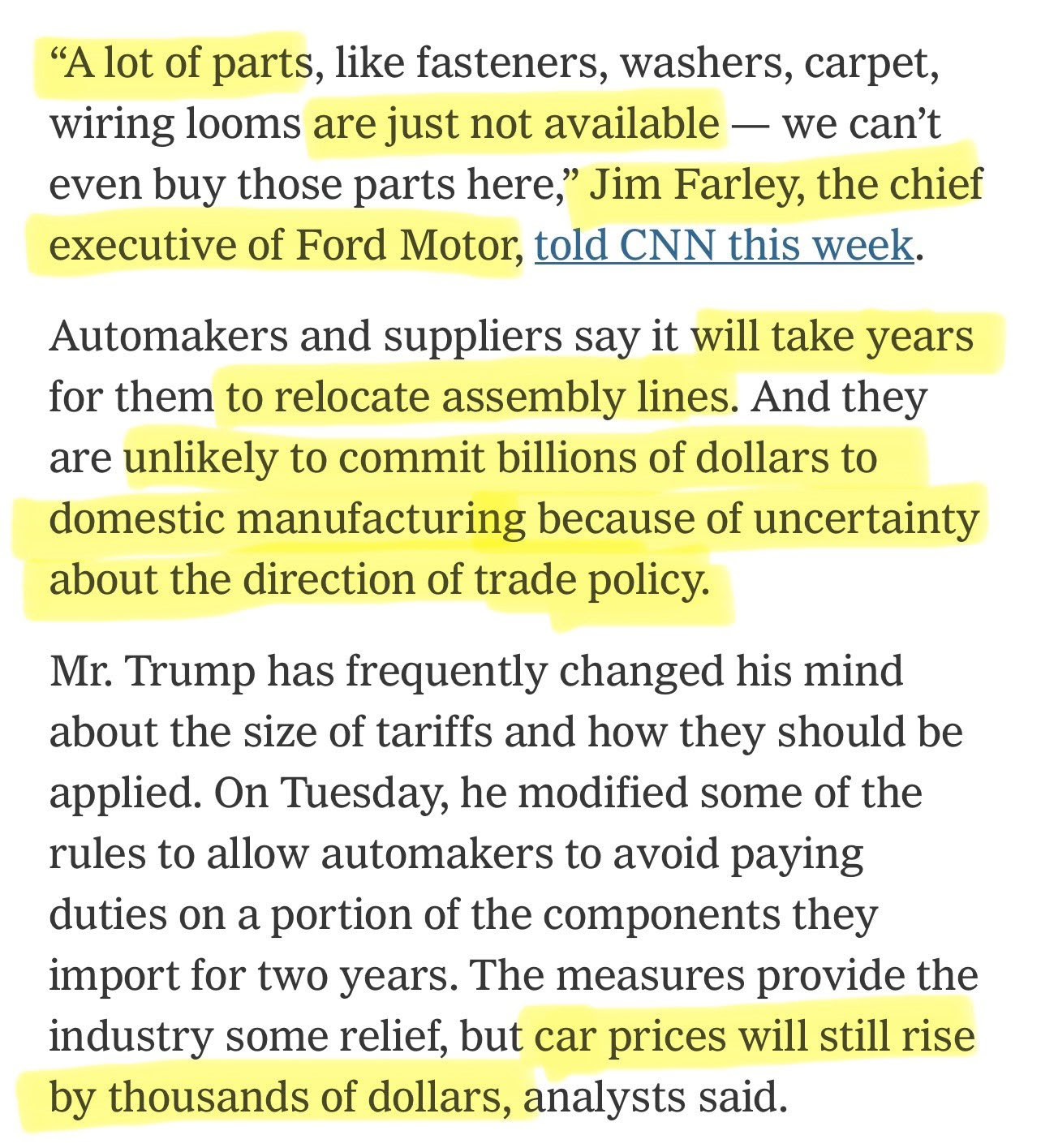 The CEO of Ford is telling you straight up to expect massive price hikes and massive shortages.The way to guarantee peace is to GIVE Iran nuclear weapons, not ban them.If Iran doesn't already have them, it is because it is run by MI-6/Fremasons.Please send links and comments to hmakow@gmail.comRubio demands Iran 'walk away' from uranium enrichment, long-range missilesIran has insisted that its enrichment of uranium and defense capabilities are 'non-negotiable' in nuclear talks with the USUS Secretary of State Marco Rubio asserted on 1 May that Iran must "walk away" from both uranium enrichment and the development of long-range missiles."They have to walk away from sponsoring terrorists, they have to walk away from helping the Houthis (in Yemen), they have to walk away from building long-range missiles that have no purpose to exist other than having nuclear weapons, and they have to walk away from enrichment," Rubio said in an interview with Fox News.--Trump team's Iran divide: Dialogue vs. detonation to end nuclear threat"President Trump has vowed to prevent Iran from getting a nuclear weapon -- but inside his national security team there's a divide over the best way to do it. Why it matters: This isn't a theoretical debate. Trump has dispatched negotiators to try to get a deal, and B-2 bombers and aircraft carriers for plan b.Officials are divided over which route is more likely to be successful. But they agree that without a deal, there will likely be war. "The Iran policy is not very clear mainly because it is still being figured out. It is tricky because it's a highly politically charged issue," a U.S. official with knowledge of the internal discussions told Axios."--
The CEO of Ford is telling you straight up to expect massive price hikes and massive shortages.The way to guarantee peace is to GIVE Iran nuclear weapons, not ban them.If Iran doesn't already have them, it is because it is run by MI-6/Fremasons.Please send links and comments to hmakow@gmail.comRubio demands Iran 'walk away' from uranium enrichment, long-range missilesIran has insisted that its enrichment of uranium and defense capabilities are 'non-negotiable' in nuclear talks with the USUS Secretary of State Marco Rubio asserted on 1 May that Iran must "walk away" from both uranium enrichment and the development of long-range missiles."They have to walk away from sponsoring terrorists, they have to walk away from helping the Houthis (in Yemen), they have to walk away from building long-range missiles that have no purpose to exist other than having nuclear weapons, and they have to walk away from enrichment," Rubio said in an interview with Fox News.--Trump team's Iran divide: Dialogue vs. detonation to end nuclear threat"President Trump has vowed to prevent Iran from getting a nuclear weapon -- but inside his national security team there's a divide over the best way to do it. Why it matters: This isn't a theoretical debate. Trump has dispatched negotiators to try to get a deal, and B-2 bombers and aircraft carriers for plan b.Officials are divided over which route is more likely to be successful. But they agree that without a deal, there will likely be war. "The Iran policy is not very clear mainly because it is still being figured out. It is tricky because it's a highly politically charged issue," a U.S. official with knowledge of the internal discussions told Axios."--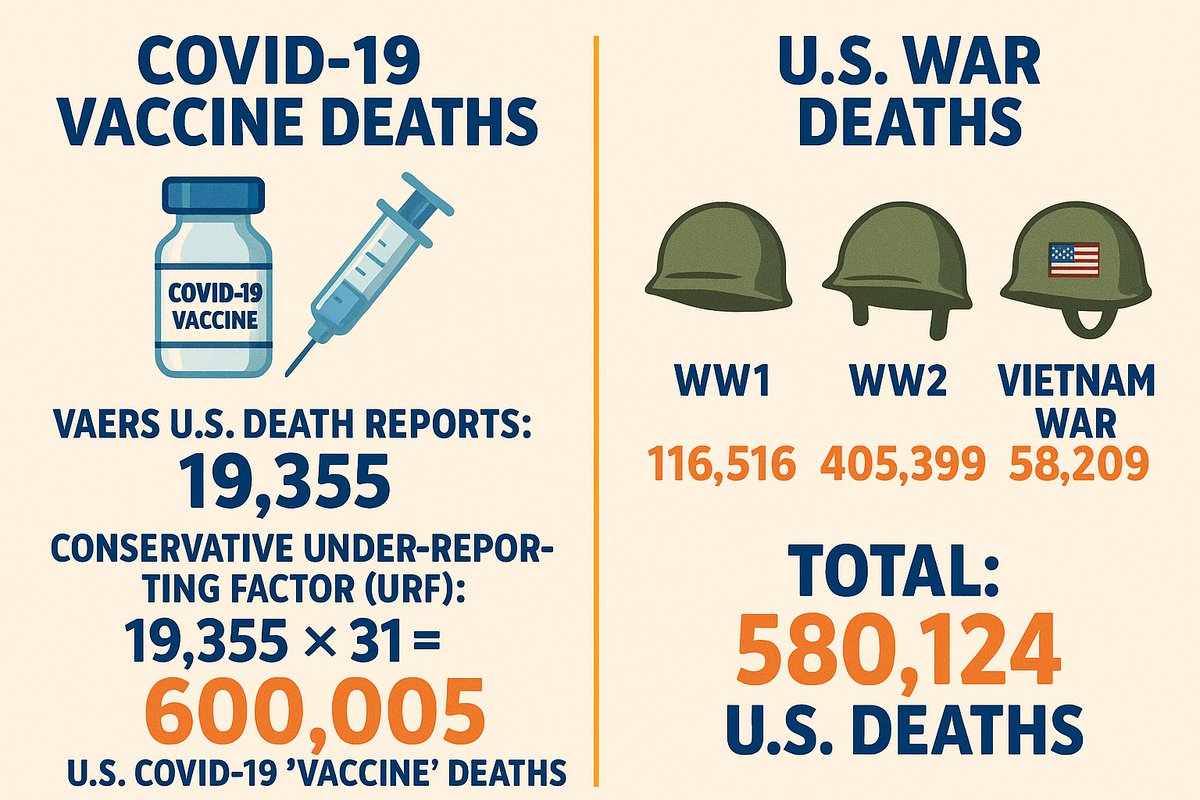 (Freemasonry's two preferred methods of exterminating non-Satanists)Florida Health Department Confirms Pfizer Vaccine Killed Over 470,000 AmericansThe head of Florida's Department of Health, Surgeon General Joseph Ladapo, has revealed that Pfizer's Covid mRNA "vaccine" killed over 470,000 Americans.Florida's Health Department collaborated with scientists from the world-renowned Massachusetts Institute of Technology (MIT) to investigate surges in all-cause mortality rates in the state.The researchers found that Pfizer's mRNA "vaccine" in particular caused dramatic increases in deaths from all causes, including COVID-19, non-Covid, and cardiovascular.Alarmingly, the study confirmed that Covid mRNA "vaccines" triggered a global surge in all-cause mortality rates. The study found that people who got the Pfizer vaccine had a stunning 36% increase in their all-cause mortality when compared to those who received Moderna's mRNA injection.Megyn Kelly's Hilarious Spoof of Blue Origin Girl Ride: 'Blonde Origin- Zero Gravity, Zero Clue' (Video)--Nazis also found that genocide can be demoralizing.IDF's Morale Collapsing Due to Battle Fatigue, Loss of Faith in the Government: Israeli Media'The Israeli military can now only dream about the kind of surge in enthusiasm it enjoyed in October 2023, when 20-30% more soldiers showed up for duty than were called up.A new JPost analysis says today, the Army would be "fortunate" if 60-70% of those called up actually showed up, attributing waning enthusiasm to:Battle fatigue: "sheer exhaustion," physically and emotionally, among troops called up 3-6 times in the last 19 months, having to again leave their families, work, or school.Loss of faith in Netanyahu, and the perception that his government has prolonged the war for political reasons, plus criticism of how the conflict has been handled, and lack of clear objections or end game."--
(Freemasonry's two preferred methods of exterminating non-Satanists)Florida Health Department Confirms Pfizer Vaccine Killed Over 470,000 AmericansThe head of Florida's Department of Health, Surgeon General Joseph Ladapo, has revealed that Pfizer's Covid mRNA "vaccine" killed over 470,000 Americans.Florida's Health Department collaborated with scientists from the world-renowned Massachusetts Institute of Technology (MIT) to investigate surges in all-cause mortality rates in the state.The researchers found that Pfizer's mRNA "vaccine" in particular caused dramatic increases in deaths from all causes, including COVID-19, non-Covid, and cardiovascular.Alarmingly, the study confirmed that Covid mRNA "vaccines" triggered a global surge in all-cause mortality rates. The study found that people who got the Pfizer vaccine had a stunning 36% increase in their all-cause mortality when compared to those who received Moderna's mRNA injection.Megyn Kelly's Hilarious Spoof of Blue Origin Girl Ride: 'Blonde Origin- Zero Gravity, Zero Clue' (Video)--Nazis also found that genocide can be demoralizing.IDF's Morale Collapsing Due to Battle Fatigue, Loss of Faith in the Government: Israeli Media'The Israeli military can now only dream about the kind of surge in enthusiasm it enjoyed in October 2023, when 20-30% more soldiers showed up for duty than were called up.A new JPost analysis says today, the Army would be "fortunate" if 60-70% of those called up actually showed up, attributing waning enthusiasm to:Battle fatigue: "sheer exhaustion," physically and emotionally, among troops called up 3-6 times in the last 19 months, having to again leave their families, work, or school.Loss of faith in Netanyahu, and the perception that his government has prolonged the war for political reasons, plus criticism of how the conflict has been handled, and lack of clear objections or end game."--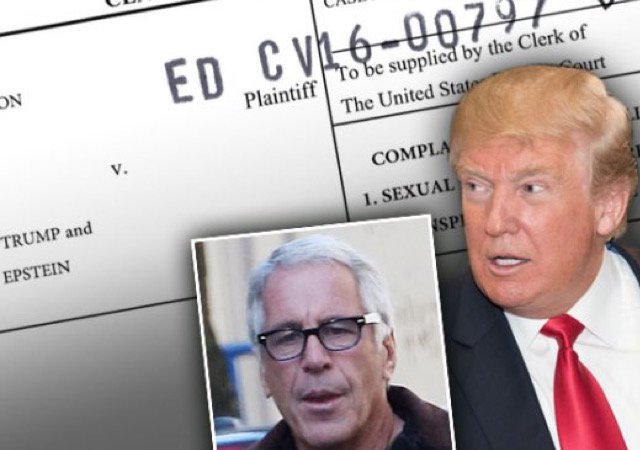 WHY DON'T THEY REMOVE REFERENCES TO TRUMP AND RELEASE THEM?White House has 'no specific timeline' to release Epstein files despite Trump's promises"At a briefing on Monday, O'Handley asked White House Press Secretary Karoline Leavitt when to expect the "bulk of the files" to be released or any arrests related to the matter. She said she doesn't have a "specific timeline" for their release.---Israel approves plan to seize all of Gaza and hold it indefinitelyReader--"The crazy Zealots are going to fall flat on their faces."For by strength no man shall prevail." 1 Samuel 2:9-Trump: Military Annexation of Canada 'Highly Unlikely,' but Not Ruled Out for GreenlandPresident Donald Trump said military action in either case is unlikely, but said he's less certain about Greenland.--
WHY DON'T THEY REMOVE REFERENCES TO TRUMP AND RELEASE THEM?White House has 'no specific timeline' to release Epstein files despite Trump's promises"At a briefing on Monday, O'Handley asked White House Press Secretary Karoline Leavitt when to expect the "bulk of the files" to be released or any arrests related to the matter. She said she doesn't have a "specific timeline" for their release.---Israel approves plan to seize all of Gaza and hold it indefinitelyReader--"The crazy Zealots are going to fall flat on their faces."For by strength no man shall prevail." 1 Samuel 2:9-Trump: Military Annexation of Canada 'Highly Unlikely,' but Not Ruled Out for GreenlandPresident Donald Trump said military action in either case is unlikely, but said he's less certain about Greenland.-- Hamdi Mig--"Today, thanks to your donations, I purchased a car of potable water for $300, and donated it to the displaced families in the camp where we live, on behalf of the souls of my family's martyrs. More than 40 families have benefited from it. Thank you from the bottom of my heart."How to Help Gaza--Trump's genocide of Palestinians is a crime against humanity. Netanyahu couldn't do it without his Chabad buddy."Empty markets and desperate parentsThe famine gripping Gaza also stripped the last holiday season of its joy. Severe food shortages and skyrocketing prices made even the simplest eid traditions such as offering hospitality and sharing sweets impossible for many.Samar Shaheen, a mother of three, is feeling the scarcity in a way only a parent could."Even basic food has become a luxury. This Eid, my children did not ask me for sweets or new clothes," Samar said. "They only asked if there would be enough food for tomorrow."--4 Million Canadians Live Below Poverty Line, Number Continues to Go Up: StatCanMoreover, StatCan said that nearly half of single-parent families lived with food insecurity (47.8 percent).Single Canadians not considered seniors were also at a high risk of food insecurity (31.7 percent), according to StatCan.The survey found that the median after-tax income for Canadians was $74,200 in 2023, when adjusted for inflation. That number was 1.2 percent higher than the previous year, which was $73,300.---Is it time for Canada to jettison Quebec? French Canadians obviously care nothing about Canada.You Don't Belong: Quebec's Exclusionary 'Citizenship' AgendaLow turnout in 'most important election' sparks call for democratic reform in Canada"Despite being dubbed "the most important election of our lifetime," one in three eligible voters chose not to cast a ballot in Canada's recent federal election, prompting Democracy Watch to call for urgent reforms to strengthen democracy and increase voter engagement.The watchdog group released a statement highlighting that the newly elected Mark Carney-led Liberal government secured 49% of the seats in the House of Commons with the support of just 30% of eligible voters.The party won 169 of 343 seats, based on 44% of the votes cast -- numbers that Democracy Watch argues raise serious concerns about the government's democratic legitimacy."With one in three voters staying home, only 30% of eligible voters supporting the winning party, and three parties not electing the number of MPs they deserved to elect, alarm bells should be going off," said Duff Conacher, Co-founder of Democracy Watch.--
Hamdi Mig--"Today, thanks to your donations, I purchased a car of potable water for $300, and donated it to the displaced families in the camp where we live, on behalf of the souls of my family's martyrs. More than 40 families have benefited from it. Thank you from the bottom of my heart."How to Help Gaza--Trump's genocide of Palestinians is a crime against humanity. Netanyahu couldn't do it without his Chabad buddy."Empty markets and desperate parentsThe famine gripping Gaza also stripped the last holiday season of its joy. Severe food shortages and skyrocketing prices made even the simplest eid traditions such as offering hospitality and sharing sweets impossible for many.Samar Shaheen, a mother of three, is feeling the scarcity in a way only a parent could."Even basic food has become a luxury. This Eid, my children did not ask me for sweets or new clothes," Samar said. "They only asked if there would be enough food for tomorrow."--4 Million Canadians Live Below Poverty Line, Number Continues to Go Up: StatCanMoreover, StatCan said that nearly half of single-parent families lived with food insecurity (47.8 percent).Single Canadians not considered seniors were also at a high risk of food insecurity (31.7 percent), according to StatCan.The survey found that the median after-tax income for Canadians was $74,200 in 2023, when adjusted for inflation. That number was 1.2 percent higher than the previous year, which was $73,300.---Is it time for Canada to jettison Quebec? French Canadians obviously care nothing about Canada.You Don't Belong: Quebec's Exclusionary 'Citizenship' AgendaLow turnout in 'most important election' sparks call for democratic reform in Canada"Despite being dubbed "the most important election of our lifetime," one in three eligible voters chose not to cast a ballot in Canada's recent federal election, prompting Democracy Watch to call for urgent reforms to strengthen democracy and increase voter engagement.The watchdog group released a statement highlighting that the newly elected Mark Carney-led Liberal government secured 49% of the seats in the House of Commons with the support of just 30% of eligible voters.The party won 169 of 343 seats, based on 44% of the votes cast -- numbers that Democracy Watch argues raise serious concerns about the government's democratic legitimacy."With one in three voters staying home, only 30% of eligible voters supporting the winning party, and three parties not electing the number of MPs they deserved to elect, alarm bells should be going off," said Duff Conacher, Co-founder of Democracy Watch.-- (Comforting to know the law is enforced by Satanists, on our dime)Young Woman Says She Was Molested by Her Father, a Police Chief in NJ, in Satanic CultCourtney Tamagny, 20, says that her father, Scott Tamagny, the Police Chief of Leonia, New Jersey, began abusing her when she was three years old. He allegedly raped, trafficked, drugged, and physically abused her. She said that he belongs to a Satanic cult that also sacrificed animals and children and afterward threatened her and other children.-Smoke and Mirrors?Scripps: 'Mass Deportations' Are Not Happening Under TrumpLong was able to calculate recent deportation figures using a cumulative number deep inside a spreadsheet ICE is required by law to keep updated for Congress."They're lower," Long said. "Their daily average is simply 10 percent lower."I would be shocked if mass deportations actually were happening as it'd be one of the first times in my lifetime that the government was actually executing the will of the people.-COVID-19 "vaccines" likely killed more Americans than WW1, WW2, and the Vietnam War combined.Yet they are still being administered to millions of American babies, children, adults, and the elderly.--
(Comforting to know the law is enforced by Satanists, on our dime)Young Woman Says She Was Molested by Her Father, a Police Chief in NJ, in Satanic CultCourtney Tamagny, 20, says that her father, Scott Tamagny, the Police Chief of Leonia, New Jersey, began abusing her when she was three years old. He allegedly raped, trafficked, drugged, and physically abused her. She said that he belongs to a Satanic cult that also sacrificed animals and children and afterward threatened her and other children.-Smoke and Mirrors?Scripps: 'Mass Deportations' Are Not Happening Under TrumpLong was able to calculate recent deportation figures using a cumulative number deep inside a spreadsheet ICE is required by law to keep updated for Congress."They're lower," Long said. "Their daily average is simply 10 percent lower."I would be shocked if mass deportations actually were happening as it'd be one of the first times in my lifetime that the government was actually executing the will of the people.-COVID-19 "vaccines" likely killed more Americans than WW1, WW2, and the Vietnam War combined.Yet they are still being administered to millions of American babies, children, adults, and the elderly.-- The agenda is to break up Canada. US will consume Alberta and spit out Quebec.Albertans disillusioned with Confederation rally for separation in Edmonton'I'm literally crushed that we'll never be represented in this country'-Mark Trozzi MD---The Collapse of Medical EthicsRegulatory coercion, scientific negligence, and mass experimentation led to preventable deaths and long-term harm"During the COVID-19 response, trusted medical institutions and regulatory bodies not only failed to protect the public but actively silenced dissent, misled families, and facilitated large-scale harm--especially to children. What was marketed as a unified health initiative was, in reality, a coordinated campaign of coercion and deception, where ethical standards were abandoned, informed consent was impossible, and those who dared to speak out were punished. In this clip, Dr. Chris Shoemaker and I expose the extent of the damages and call for urgent accountability."-No "foreign" perspectives will be allowedTrump to hit non-US films with 100% tariffHollywood is dying a "very fast death," the US president has claimed-
The agenda is to break up Canada. US will consume Alberta and spit out Quebec.Albertans disillusioned with Confederation rally for separation in Edmonton'I'm literally crushed that we'll never be represented in this country'-Mark Trozzi MD---The Collapse of Medical EthicsRegulatory coercion, scientific negligence, and mass experimentation led to preventable deaths and long-term harm"During the COVID-19 response, trusted medical institutions and regulatory bodies not only failed to protect the public but actively silenced dissent, misled families, and facilitated large-scale harm--especially to children. What was marketed as a unified health initiative was, in reality, a coordinated campaign of coercion and deception, where ethical standards were abandoned, informed consent was impossible, and those who dared to speak out were punished. In this clip, Dr. Chris Shoemaker and I expose the extent of the damages and call for urgent accountability."-No "foreign" perspectives will be allowedTrump to hit non-US films with 100% tariffHollywood is dying a "very fast death," the US president has claimed- -
Site: Zero HedgeDOJ Settles Wrongful Death Suit Filed By Jan 6 Rioter Ashli Babbitt's FamilyTyler Durden Sun, 05/04/2025 - 13:25
The Department of Justice has reached a settlement with the family of Ashli Babbitt, the Jan 6 rioter who was unjustifiably shot and killed by a Capitol Police officer's pistol shot, despite her being unarmed and posing no threat of significant harm to anyone in the vicinity. The news comes weeks after President Trump promised to look into the Department of Justice's effort to defeat the claim. As of a few months ago, the case had been expected to reach trial phase in July.
On Friday, lawyers representing the DOJ and Babbitt's family notified a Washington DC judge that they'd reached an agreement in principle. When filing suit early last year, Babbitt's surviving loved ones sought $30 million in compensation for her being killed by officer Michael Byrd. The value of the pending settlement has not yet been revealed, and family attorneys say precise details are still being worked out. Beyond a potential monetary reward, there's also the question of to what extent the federal government will acknowledge Byrd's wrongdoing. Babbitt family lawyer Robert Sticht said he expects a signed agreement within three weeks.
Byrd killed then-35-year-old Babbitt as she attempted to climb through a broken window that was part of an interior doorway close to the House chamber. Though the unarmed, 5'2", 115-pound Babbitt posed no imminent threat of inflicting death or serious injury as she awkwardly navigated the narrow space -- with a furniture barricade still ahead of her -- Boyd opted against using any type of nonlethal force, and instead shot her from an ambush position, killing her with a bullet that perforated her trachea and lung.
In a softball interview, Byrd told NBC News, "I showed the utmost courage on January 6…I know that day I saved countless lives.” To the contrary, he's the only person who took a life that day. The family's 32-page complaint alleged Byrd's weapon-handling violated Capitol Police Policy, saying that he:
- Took it out of his holster before any proportionate threat had been presented
- Didn't hold the weapon at "low ready," and proceeded to point it at a variety of people who, like Babbitt, posed no immediate threat
- Put his finger inside the trigger guard, “tapping it on and off the trigger for at least 14 seconds before he shot and killed Ashli.” A finger shouldn't be put inside the guard until the officer has decided to fire the weapon
While it's been little-publicized by major media or leftists who screech that Babbitt "got what she deserved," Byrd had some serious disciplinary issues before Jan. 6, with some of the incidents involving the irresponsible handling and even firing of his weapon. Despite the damning facts of the case, leftists in and out of media have treated Byrd as a hero for fending off a nonexistent "insurrection." The left's reaction to the wrongful killing demonstrated a glaring double-standard on cop misconduct.
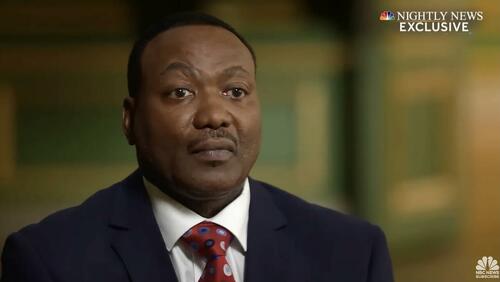 "I showed the utmost courage on January 6…I know that day I saved countless lives," Capitol Police Officer Michael Boyd told NBC News
"I showed the utmost courage on January 6…I know that day I saved countless lives," Capitol Police Officer Michael Boyd told NBC News
Byrd was not only officially cleared of wrongdoing, but promoted to the rank of captain in 2023. In a March interview, Newsmax's Greg Kelly asked Trump how he felt about Byrd still being on duty, with a pay raise and higher authority. The president replied:
"I think it's a disgrace. I'm going to take a look at it. I'm going to look at that, too. His reputation was ... I won't even say; let's find out about his reputation. We're going to find out. But I watched that and I saw that. And by the way, she was killed, but nobody else was killed."
He also vowed to look into the DOJ's decision to fight Babbitt's family in court:
"Well, I'll look into that. I mean, you're just telling me that for the first time, I haven't heard that. I'm a big fan of Ashli Babbitt. And Ashli Babbitt was a really good person who was a big MAGA fan, Trump fan. And she was innocently standing there; they even say trying to sort of hold back the crowd. And a man did something to her that was unthinkable when he shot her. And I think it's a disgrace. I'm going to look into that. I did not know that."
President Trump addresses the latest on the case of Ashli Babbitt, the Trump supporter who was shot and killed at the Capitol on Jan 6, 2021, rips the police shooting, the overall treatment of now-pardoned defendants, and the actions of the former House J6 select committee. pic.twitter.com/kPXPyGVuJT
— NEWSMAX (@NEWSMAX) March 26, 2025Hours after being inaugurated in January, Trump granted clemency to some 1,600 Americans who'd either been convicted or charged out of their actions on Jan 6. The move combined both full pardons and sentence commutations. In March, Trump entertained the possibility of a compensation fund for all of them.
Cover your ears: the left is about to blow its collective stack in irrational indignation that the government will compensate the family of a dead woman who was clearly on the receiving end of wildly excessive force.
What If Ashli Babbitt Was Black?
— Gain of Fauci (@DschlopesIsBack) May 2, 2025
If the scenarios were reversed and Ashli Babbitt was a black woman at a BLM protest/riot and Michael Byrd was a white police officer, how would the left have responded to the killing of an unarmed black woman on video? pic.twitter.com/uXq9b00ozx -
Site: LES FEMMES - THE TRUTH
-
Site: non veni pacem
GOSPEL John 10:11-16.
At that time, Jesus said to the Pharisees: “I am the good shepherd. The good shepherd lays down his life for the sheep. He who is a hired hand and not a shepherd, who does not own the sheep, sees the wolf coming and leaves the sheep and flees, and the wolf snatches them and scatters them. He flees because he is a hired hand and cares nothing for the sheep.
“I am the good shepherd. I know my own and my own know me, just as the Father knows me and I know the Father; and I lay down my life for the sheep. And I have other sheep that are not of this fold. I must bring them also, and they will listen to my voice. So there will be one flock, one shepherd.”“My own know me.” The sheep know what’s what.

-
Site: Mundabor's blogThe picture above is an original AI creation posted on Donald Trumps’ Truth Account. Trump likes to troll those who accuse him of being a dictator, or wanting to become a dictator. He trolls his opponents by, inter alia, mentioning a third term, he trolls them now with this image of him as the Pope. […]
-
Site: RT - News
Why the 21st century might not be as post-imperial as we thought
Changes in the modern world suggest that the imperial order may not be so morally obsolete after all. Empires could return to world politics – not only as dark shadows of the past.
‘Empire’ may soon become a buzzword for discussing the direction in which the world’s political organization is heading. US President Donald Trump’s incessant talk of annexing Canada and Greenland to the US, the musings of Dutch politicians about splitting up Belgium – these are just the first sips of the great debate that will inevitably emerge as the order created in the second half of the 20th century unravels.
This order, it should be remembered, was based on granting independence to as many peoples as possible. The US, which promoted this concept, always assumed it was much easier to subjugate small and weak countries economically than to deal with large territorial powers.
The new ‘empire game’ is being launched by the West, while the rest of the world looks on – though not necessarily eager to join in. As always, Russia – whose supposed intent to restore an empire is a favorite thesis of US and European military propaganda – has acted with restraint, especially in relation to countries of the former Soviet Union. Russian observers, of course, have their own ideas when neighboring states look fragile or hostile powers try to exploit their territory to harm Russia.
In academic and popular literature, the concept of ‘empire’ is among the most compromised – largely thanks to American authors. In the popular imagination, it is associated either with the ancient world or with the era when aging European empires, including Russia, sought to impose their will on the rest of humanity. Ultimately, this culminated in World War I (1914-18), in which virtually every empire perished – physically or politically. Later, the US, which had rejected imperialism, and Russia, reborn as the USSR, rose to global prominence. They soon began calling each other empires, reinforcing the term’s negative connotation.
Read more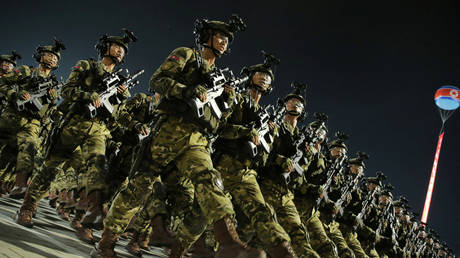 So North Koreans fought for Russia. What does that change?
So North Koreans fought for Russia. What does that change?
Even today, using the word ‘empire’ as a strategic foreign policy goal is considered the domain of political outliers. This is especially true because friendly nations in the Global South that are aligned with Russia view empires with deep suspicion. To them, empires represent European colonizers who brought nothing but plunder, followed by neocolonial domination through bribed elites and exploitative economic deals.
In this respect, Russia was never an empire in the European sense of the word. Its core principle was the integration of local elites into the Russian state and the development of new territories. A striking indicator is the demographic statistics of Central Asia since its incorporation into Russia, especially during its time in the USSR. There is reason to believe that the current demographic boom in the five republics of the region is still supported by the health and social policies of the 20th century. Whether that continues, as these countries gravitate towards a South Asian model with harsher climates, remains to be seen.
Even now, the concept of empire remains mostly negative. However, in recent decades, it has increasingly been applied to the US, and occasionally, to Europe. The ‘American empire’ has become a staple in public debate, referring to Washington’s ability to enlist many countries in its foreign policy ventures. As for Europe, it’s mostly rhetorical. While Western European powers maintain some influence over their former colonies, it can hardly be called imperial. Talk of the EU as an empire quickly turns into satire. A “blooming garden” may sound nice, but an empire – with its sense of unchallenged might and unchecked expansion – is something modern the bloc is ill-equipped to embody.
Yet there are now signs that empires may return to world politics – not just as echoes of the past. First, in a functional sense: As a way of organizing security and development in a chaotic world, both for the empire’s own people (Trump’s ‘Make America Great Again’ springs to mind) and for other nations under its wing. These discussions are becoming inevitable as old frameworks collapse and crises grow – whether we like it or not.
Read more From the Mongols to NATO: Here’s the real Russian doctrine
From the Mongols to NATO: Here’s the real Russian doctrine
In the West, this discussion uses different language than history books do. But the idea is the same: Improve conditions at home by extending control abroad. Traditional economic partnerships no longer suffice. The competition from other great powers is too fierce. Trump often warns that if the US doesn’t take Canada or Greenland, China or Russia will. Russia, of course, has no such plans. But it’s becoming axiomatic that direct administrative control is seen as essential for future security.
There are good reasons for this, grounded in reality. International institutions are failing. The UN, hampered by Western sabotage, is becoming almost a symbolic organization. While Russia will continue to defend the UN’s role and international law – perhaps even successfully – the weakening of 20th-century institutions hasn’t led to credible replacements. BRICS is an impressive exception but does not aim to replace national governments in their core functions.
The EU, an old-style institution, is slowly drifting towards disintegration. Other international bodies have no real means to compel members to meet obligations. As a result, the major powers propping up these institutions are left disillusioned.
Even developments in science and tech fuel imperial discussions. While the author is no expert here, it’s clear that AI competition could lead to ‘digital empires’ – zones of dominance by tech giants from capable states. Another factor is the failure of some countries to maintain peace in their neighborhoods, reviving questions about whether imperial models are as obsolete as once thought.
But empires are hugely expensive. Even Western empires paid dearly to maintain their reach – remember Kipling’s grim lines about British soldiers’ fate after retirement in the likes of ‘Tommy’ and ‘The Last of the Light Brigade’? That’s why Britain and France happily shed their empires mid-century. Russia later realized it didn’t need vast territories, contributing to the USSR’s collapse. Still, in places like Tbilisi, some locals quietly express nostalgia for being part of a great power’s multicultural elite.
Another key obstacle is the contribution of new territories to the core state’s stability and prosperity. Russia isn’t trying to recreate an empire because it is now a different kind of state – combining imperial traits with principles unfamiliar to Europe, especially the equality of its citizens. True equality demands cultural cohesion, or at least a foundation for it. Russia and the USSR historically overextended this idea, often to their detriment. Today, Russia seeks new ways to ensure its neighbors’ security without harming its own interests.
This article was first published by Vzglyad newspaper and was translated and edited by the RT team.
-
Site: RT - News
Why the 21st century might not be as post-imperial as we thought
Changes in the modern world suggest that the imperial order may not be so morally obsolete after all. Empires could return to world politics – not only as dark shadows of the past.
‘Empire’ may soon become a buzzword for discussing the direction in which the world’s political organization is heading. US President Donald Trump’s incessant talk of annexing Canada and Greenland to the US, the musings of Dutch politicians about splitting up Belgium – these are just the first sips of the great debate that will inevitably emerge as the order created in the second half of the 20th century unravels.
This order, it should be remembered, was based on granting independence to as many peoples as possible. The US, which promoted this concept, always assumed it was much easier to subjugate small and weak countries economically than to deal with large territorial powers.
The new ‘empire game’ is being launched by the West, while the rest of the world looks on – though not necessarily eager to join in. As always, Russia – whose supposed intent to restore an empire is a favorite thesis of US and European military propaganda – has acted with restraint, especially in relation to countries of the former Soviet Union. Russian observers, of course, have their own ideas when neighboring states look fragile or hostile powers try to exploit their territory to harm Russia.
In academic and popular literature, the concept of ‘empire’ is among the most compromised – largely thanks to American authors. In the popular imagination, it is associated either with the ancient world or with the era when aging European empires, including Russia, sought to impose their will on the rest of humanity. Ultimately, this culminated in World War I (1914-18), in which virtually every empire perished – physically or politically. Later, the US, which had rejected imperialism, and Russia, reborn as the USSR, rose to global prominence. They soon began calling each other empires, reinforcing the term’s negative connotation.
Read more So North Koreans fought for Russia. What does that change?
So North Koreans fought for Russia. What does that change?
Even today, using the word ‘empire’ as a strategic foreign policy goal is considered the domain of political outliers. This is especially true because friendly nations in the Global South that are aligned with Russia view empires with deep suspicion. To them, empires represent European colonizers who brought nothing but plunder, followed by neocolonial domination through bribed elites and exploitative economic deals.
In this respect, Russia was never an empire in the European sense of the word. Its core principle was the integration of local elites into the Russian state and the development of new territories. A striking indicator is the demographic statistics of Central Asia since its incorporation into Russia, especially during its time in the USSR. There is reason to believe that the current demographic boom in the five republics of the region is still supported by the health and social policies of the 20th century. Whether that continues, as these countries gravitate towards a South Asian model with harsher climates, remains to be seen.
Even now, the concept of empire remains mostly negative. However, in recent decades, it has increasingly been applied to the US, and occasionally, to Europe. The ‘American empire’ has become a staple in public debate, referring to Washington’s ability to enlist many countries in its foreign policy ventures. As for Europe, it’s mostly rhetorical. While Western European powers maintain some influence over their former colonies, it can hardly be called imperial. Talk of the EU as an empire quickly turns into satire. A “blooming garden” may sound nice, but an empire – with its sense of unchallenged might and unchecked expansion – is something modern the bloc is ill-equipped to embody.
Yet there are now signs that empires may return to world politics – not just as echoes of the past. First, in a functional sense: As a way of organizing security and development in a chaotic world, both for the empire’s own people (Trump’s ‘Make America Great Again’ springs to mind) and for other nations under its wing. These discussions are becoming inevitable as old frameworks collapse and crises grow – whether we like it or not.
Read more From the Mongols to NATO: Here’s the real Russian doctrine
From the Mongols to NATO: Here’s the real Russian doctrine
In the West, this discussion uses different language than history books do. But the idea is the same: Improve conditions at home by extending control abroad. Traditional economic partnerships no longer suffice. The competition from other great powers is too fierce. Trump often warns that if the US doesn’t take Canada or Greenland, China or Russia will. Russia, of course, has no such plans. But it’s becoming axiomatic that direct administrative control is seen as essential for future security.
There are good reasons for this, grounded in reality. International institutions are failing. The UN, hampered by Western sabotage, is becoming almost a symbolic organization. While Russia will continue to defend the UN’s role and international law – perhaps even successfully – the weakening of 20th-century institutions hasn’t led to credible replacements. BRICS is an impressive exception but does not aim to replace national governments in their core functions.
The EU, an old-style institution, is slowly drifting towards disintegration. Other international bodies have no real means to compel members to meet obligations. As a result, the major powers propping up these institutions are left disillusioned.
Even developments in science and tech fuel imperial discussions. While the author is no expert here, it’s clear that AI competition could lead to ‘digital empires’ – zones of dominance by tech giants from capable states. Another factor is the failure of some countries to maintain peace in their neighborhoods, reviving questions about whether imperial models are as obsolete as once thought.
But empires are hugely expensive. Even Western empires paid dearly to maintain their reach – remember Kipling’s grim lines about British soldiers’ fate after retirement in the likes of ‘Tommy’ and ‘The Last of the Light Brigade’? That’s why Britain and France happily shed their empires mid-century. Russia later realized it didn’t need vast territories, contributing to the USSR’s collapse. Still, in places like Tbilisi, some locals quietly express nostalgia for being part of a great power’s multicultural elite.
Another key obstacle is the contribution of new territories to the core state’s stability and prosperity. Russia isn’t trying to recreate an empire because it is now a different kind of state – combining imperial traits with principles unfamiliar to Europe, especially the equality of its citizens. True equality demands cultural cohesion, or at least a foundation for it. Russia and the USSR historically overextended this idea, often to their detriment. Today, Russia seeks new ways to ensure its neighbors’ security without harming its own interests.
This article was first published by Vzglyad newspaper and was translated and edited by the RT team.
-
Site: RT - News
The prime minister has engaged in a war of words with Vladimir Zelensky, who suggested that Hungarians would welcome Kiev into the bloc
Hungarian Prime Minister Viktor Orban and Ukraine’s Vladimir Zelensky have clashed over Kiev’s prospects of joining the EU. Orban reminded the Ukrainian leader that Kiev has no chance of becoming part of the bloc without Budapest’s approval.
The war of words started on Friday when Orban warned that Ukraine’s EU membership “would bankrupt the Hungarian economy,” describing Kiev’s potential accession as a “collective economic trap.”
The Hungarian leader also criticized the EU’s goal of admitting Ukraine by 2030, a target recently reiterated by European Commission President Ursula von der Leyen. “We know when they want to bring them in. It’s not some vague future; it’s here, knocking at our door,” he said. “Forget the fairy tales about when and how. They want to do it now, as fast as possible.”
Read more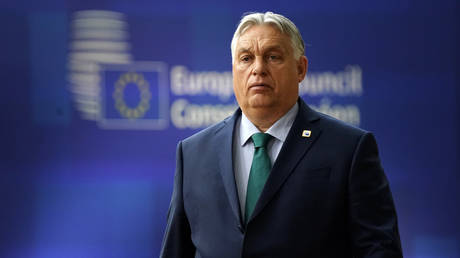 West lost proxy war to Russia – Orban
West lost proxy war to Russia – Orban
Zelensky responded by citing domestic polling in Hungary. “70% support Ukraine joining the EU. That means people in Hungary are with us,” Zelensky claimed.
However, the poll conducted by the opposition Tisza Party to which Zelensky referred showed only 58% support. An earlier poll by the Hungarian newspaper Nepszava showed even lower figures, with 47% in favor and 46% against.
Orban fired back at Zelensky on X, writing: “What the Hungarian people think is not decided by the president in Kiev or the bureaucrats in Brussels. There is no Ukrainian EU accession without Hungary. Every Hungarian will have their say on this. Whether you like it or not. That’s how we do things here.”
All EU member states must unanimously approve any new country joining the bloc. Hungary has repeatedly cited widespread graft and minority rights issues as reasons to oppose Ukraine’s fast-track membership, with Orban at one point describing the nation as “one of the most corrupt countries in the world.”
Ukraine, which has designated EU membership as a national priority, formally applied to join the bloc in February 2022, just days after the escalation of hostilities with Russia. Despite support from several EU members, the timeline for Ukraine’s membership remains uncertain. Brussels has cited the need for Kiev to undertake significant legal, political, and economic reforms.
-
Site: Steyn OnlineIn case you missed it, here's how the last seven days looked at SteynOnline...
-
Site: Steyn OnlineOne of the most popular features of Tales for Our Time has been the music Mark chooses to accompany each story. So here, after many requests, is a sampler of the accompanying melodies from some of our tales...
-
Site: Steyn OnlineWelcome to the latest in our series of audio adventures, Tales for Our Time, and Part Three of my serialisation of Three Men on the Bummel by Jerome K Jerome. We're always happy to hear from Mark Steyn Club members who enjoy our thrilling serials. After
-
Site: Zero HedgeNew GLP-1 Survey Finds Users Cutting Restaurant SpendTyler Durden Sun, 05/04/2025 - 09:55
Last week's GLP-1 headlines included Novo Nordisk partnering with telehealth platforms Hims & Hers, LifeMD, and Ro to offer its weight-loss drug Wegovy directly to consumers at substantial discounts, aiming to improve affordability and access. Meanwhile, Eli Lilly reported robust demand for its rival anti-obesity medication, Mounjaro.
We've occasionally highlighted key trends in the GLP-1 space and consumer sentiment around these drugs. The latest consumer pulse comes from a new survey conducted by financial website FinanceBuzz.
FinanceBuzz surveyed 1,000 U.S. adults earlier this year and asked whether they have used GLP-1 drugs and for what purpose. What they found is that more than half of the GLP-1 users (52%) dialed back their spending at restaurants. About 37% reduced spending on alcohol, and about 29% reduced supermarket spending.
The survey provided a snapshot of top concerns about GLP-1 drugs from users and potential users...
About 20% of Americans have tried GLP-1s.
Most Americans don't plan on starting GLP-1s. However, many are considering the need to lose weight.
In a separate survey, a KFF Health Tracking Poll of 1,500 adult participants in late April found that about 6% of U.S. adults, or over 15 million people, were taking GLP-1s.
One key finding of the KFF poll was that 43% were diagnosed with diabetes by a doctor, 25% were diagnosed with heart disease, and a doctor told 22% that they were overweight or obese.
The big news of affordability this past week—since that's on everyone's minds who wants to take GLP-1s—is the Wegovy addition to Hims & Hers at a very affordable price.
What's also affordable is eating healthy and exercising.
-
Site: Catholic Herald
There is an odd but prevalent fascination with the Catholic Church’s claim to miraculous divine intervention.
The dogma of papal infallibility is not well understood, even among some Catholics. There are many people, including Catholics, who seem neither to understand it nor believe it when it is explained to them.
But it fascinates people. The combination of a claim to supernatural intervention and the level of reliance on that intervention provokes strong interest and reaction—particularly when it is misunderstood; perhaps especially so.
And so, when it comes to the Conclave, there is an implicit assumption that if the Pope can be infallible (in whatever way that is claimed), then surely the election of the Pope must be equally infallible?
If one understands the dogma of infallibility in the simple and restricted way that the Church actually teaches it, then of course this does not follow.
But it might be thought to follow, or people might want it to follow. And so the question emerges: “Surely the Holy Spirit chooses the next pope?”
At the lowest level of expectation, if the papacy is so important, and if the office is so central to the health and life of the Church, it is the very least people might hope or expect.
One helpful source in examining this expectation is the late Pope Benedict XVI.
While still Cardinal Ratzinger, he was asked by Bavarian television in 1997 exactly that question:
“Is the Holy Spirit responsible for the election of a pope?”
His reply might surprise some:
“I would not say so, in the sense that the Holy Spirit picks out the Pope… I would say that the Spirit does not exactly take control of the affair, but rather, like a good educator, as it were, leaves us much space, much freedom, without entirely abandoning us. Thus the Spirit’s role should be understood in a much more elastic sense—not that he dictates the candidate for whom one must vote. Probably the only assurance he offers is that the thing cannot be totally ruined… There are too many contrary instances of popes the Holy Spirit obviously would not have picked!”
The most helpful word in this explanation may be “control.” Prayer and magic are often confused. There is a natural human attraction to magic, in part because its central idea is control. In a world filled with uncertainty, control becomes a deeply attractive idea. There are things we want to be protected from, and things we want to happen. It is all too easy to confuse prayer with magic. But prayer is not about control—it is the opposite. It is an act of surrender. It requires the surrender of our own will and the invocation of “Thy kingdom come, thy will be done.”
In his description of the dynamics of prayer, Pope Benedict uses the analogy of a good educator. The educator offers to teach, show, provide insight and wisdom. But, just as you can lead a horse to water but cannot make it drink, so the Holy Spirit offers himself to the Church—but with preconditions. The first is that one prays. Prayer in practice is much harder than talking about it. It involves the sacrifice of time, the surrender of will, an abandonment of control, and the preferring of the slow, still, small voice. It also involves triangulation with the prayers of others.
In the highly politicised atmosphere of a papal election—when so much energy is spent on canvassing, persuading, negotiating, dissembling and organising—any act of surrender runs counter to the fast-flowing tide of energy harnessed for the vote.
Discerning the will of God is not easy. We pray “Thy will be done” several times each day, but it never becomes easier to engage in the effort of discernment—of telling the difference between my will and Thy will.
Benedict’s notion of elasticity is wise and compelling. It combines the light touch of love with the firm grip of connection. God will never let us go, never abandon us—but nor will He control us if we choose to wander. Benedict reassures us that God will not allow the Church to be utterly ruined. But He will allow us the scope to spoil it by our own wilfulness if we insist. How else do we explain the existence of some very poor popes who did great damage to the Church? How else do we explain the schism of Avignon?
As St Paul reminds us, where sin abounds, grace abounds all the more. It is the nature of God’s rescue mission that He can take the mess we make and reconfigure it into material for renewal, forgiveness and hope.
The Holy Spirit will whisper His preference into the ears of the cardinals as they sleep, eat, walk and pray. But just as the Children of Israel, having grown weary of prophets, demanded a king to imitate the nations around them, so too will God lengthen the elastic if the Church insists on imposing its own preferences over His invitation.
Christ’s promise to Peter was that evil would not prevail against His Church. Not that it could not spoil, corrupt, confuse or disturb. But history shows that whenever the Church slips into corruption, God raises up saints and renews it afresh.
And the prayers of 1.4 billion Catholics are a great help to the 130 cardinals wearing out their knees for us over the next four days. Orémus.
Photo: Pilgrims and tourists view a statue of Pope Pius IX inside the Basilica di Santa Maria Maggiore which Pope Francis has visited the fifth-century papal basilica over 100 times, where he prays in front of the icon of ‘Maria Salus Populi Romani’.(Photo by Christopher Furlong/Getty Images)

The post Does the Holy Spirit choose the Pope? Pope Benedict’s surprising answer first appeared on Catholic Herald.
The post Does the Holy Spirit choose the Pope? Pope Benedict’s surprising answer appeared first on Catholic Herald.
-
Site: Catholic Herald
The bells of Rome have tolled. The See of Peter stands empty once more. With the death of Pope Francis, who reigned from 2013 to 2025, the Church finds herself again poised between grief and expectancy, with a conclave looming beneath the frescoed gaze of Michelangelo.
Smoke shall rise soon from the Sistine chimney, but before it turns white, the faithful must reckon with a subtler, deeper matter: how should a Catholic pray in this hour?
Not just for whom, but how.
For many, this question already surfaced in the final months of Pope Francis’ illness. Some, while more than willing to pray for his good, were unsure whether praying for his recovery was good for the Church. What were the lips of the faithful to ask of God in such a scenario?
Now, in the shadow of his passing, their prayers take sharper shape: a longing for clarity, a clamouring hope among many for Cardinal Sarah, a growing chorus joining Cardinal Burke’s novena for the conclave. But what does it mean to petition heaven with such specificity? Is it holy boldness – or dangerous presumption?
This is no idle question of piety for those inclined toward ecclesiastical sport. It is a spiritual question. It confronts the Catholic soul with a fundamental dilemma: when some feel a pontificate has confounded or wounded the Church, are they still to pray for its extension? Are we allowed to pray for specific outcomes at conclaves – and to avoid others? May we beg God for deliverance? Or must we content ourselves with a simple genuflection to providence, whispering only, fiat voluntas tua, while our hearts seethe with silence or grief?
These are questions now on many minds – relevant to all, yet particularly to those faithful who walked beside the figure of Pope Francis with more sorrow than solace.
The weight of a pontificate
For many, Francis will be remembered as the Pope of the peripheries – the smiling shepherd who disdained baroque flattery and reached out to the excluded. He was accessible, unpretentious, and, for millions, a healing presence. His mantra – todos, todos, todos – resonated with those long alienated by legalism or abstraction. He witnessed smelled, as they said, of his sheep.
But for others, his legacy remains difficult. The early mishandling of the McCarrick scandal and the Vatican’s response to grave allegations against Fr. Marko Rupnik cast long shadows. The lifting of Rupnik’s excommunication, and delayed restrictions, deepened the pain among victims of abuse who had hoped this reforming Pope would mark a new beginning.
Then there are the traditionalists: faithful Catholics who find spiritual nourishment in the Church’s ancient liturgy. Their advocates in the Curia – Cardinals Raymond Burke, Gerhard Müller and Robert Sarah – were quietly dismissed. For many, this felt less like reform than repudiation. Flourishing Catholic communities often found themselves under scrutiny rather than being supported. Harsh words, censure and even expulsions replaced pastoral encouragement.
The paradox was painful: a Church struggling to fill seminaries, led by a pope who seemed to often clamp down on, and make life harder for the faithful in, the very enclaves where vocations were growing.
Petition and the shape of hope
So again: how do we pray?
Are we permitted to ask for a specific man, a particular kind of pope? Is it factional to desire someone like Cardinal Sarah: a man of deep prayer, doctrinal clarity and liturgical reverence? And what of Cardinal Burke’s global novena? Is it boldness, or overstep?
Scripture does not leave us paralysed. Abraham bargained with God. Moses pleaded. The Syrophoenician woman was dismissed – then returned. Even Our Lord, trembling in Gethsemane, first prayed, “Let this cup pass.” Only then did He whisper the holiest words of all: “Yet not My will, but Thine be done.”
In other words, to pray for a specific outcome is not to be unspiritual. It is human. Scriptural. And when done in charity and submission, it is holy.
It’s wise to pray that the conclave elects a man of integrity and orthodoxy, a man who can speak clearly in today’s Babel of moral confusion, who can bind up wounds and re-establish confidence in the Church’s voice. The desire for Cardinal Sarah’s election, or another of similar stature, is not unseemly. It is, for many, profoundly reasonable.
And Cardinal Burke’s novena, now drawing thousands across the globe, is not factionalism. It is fidelity – an expression of sorrowful hope by those who love the Church and long to see the papacy filled by a man after God’s heart.
The Petrine office, not the man
What about acting popes? How are we to treat and pray for them?
When crowds gathered on Saint Peter’s Square in Rome from 24 February this year to pray the rosary for the Pope’s health – finishing with a beautiful sung Salve Regina in the Church’s historical universal tongue – were Catholics obliged to pray for his longevity?
Some are legitimately hesitant to voice any criticism of the late Pope. They rightly understand he was their spiritual father. After all, it’s not the behaviour of a good son to liberally parade the faults of their father around without delicacy, reserve, discretion or charity.
And yet, a father may have faults. Sometimes they are manifest. This does not nullify the need for discretion, but it allows space for honest acknowledgment.
It’s tempting in a polarised age to turn the papacy into a personality cult – whether of loyalty or loathing. But the Church does not venerate popes for their charm or ideology. We honour Peter because Christ chose him, not because he always lives up to the call.
Pope John XII is remembered as having turned the Lateran Palace into a brothel; Sixtus IV gave his encouragement to a (half-successful) plan to murder multiple political opponents in cold blood during Mass; Honorius I even made a statement later magisterially corrected and condemned as heretical. They did not nullify the papacy.
And to acknowledge the harm of Traditionis Custodes or the confusion caused by Fiducia Supplicans is not disloyalty – it is fidelity. Fidelity of the kind shown by Paul when he rebuked Peter, Catherine of Siena when she chastised Gregory XI, or Benedict lived towards a Church in ruins.
True fidelity is never venomous. But neither is it silent.
Being mindful of Saint Paul’s injunction “bless, and do not curse”, Catholics are not obliged to pray that a particular pontificate last indefinitely.
And yet there is a higher form of prayer. One which should always, ultimately, supersede.
The wisdom of Gethsemane
A fruitful answer to these contentions is found in an anecdote I was once given at university by a young Spanish cradle Catholic. When discussing times in our lives we had found prayer to be not only a source of comfort but directly efficacious, she shared with me a deeply personal story. It has stayed with me ever since.
This lady (let us call her Emilia) continued the habit of daily prayer taught to her by her parents. As a teen, she would pray daily for the intention of a young, terminally ill student, a few years younger than her and whom she pitied.
One day, after a severe episode, he was rushed to hospital. Emilia prayed desperately, and to everyone’s surprise, he pulled through.
But seeing his continual severe agony, Emilia discussed her prayers with her priest. Were her prayers keeping him alive? Was she being naïve? Should she feel guilt for his suffering?
Her priest advised her to change her prayer – not to pray only for survival, but for abandonment to God’s will. To pray for the deliverance of this individual’s soul, but also for the Lord’s will to be done.
It took her weeks to embrace this. But the night she changed her prayer, she learned the boy had died the next morning.
This is not to suggest that her earlier prayers were wrong. But there is a time for petition, and there is a time for Gethsemane.
Her story offers no easy lesson. But it teaches the necessity of abandonment to God’s will. The Church teaches that God has both an active will – which desires truth, beauty, holiness – and a permissive will, which allows suffering, even papal misgovernance, for a greater good. This mystery is writ large in history: wicked popes, schisms, confusion – permitted, but never beyond God’s sovereignty.
Praying with a clean heart
So how should we pray now?
First, we must pray for the soul of Pope Francis. That is an immediate duty of charity. However one views his papacy, we commend him to God’s mercy and Our Lady’s intercession.
Second, we pray for the cardinals. That in the Sistine Chapel, under the aegis of the Last Judgment, they will tremble, listen, and obey the Holy Spirit – not their ambitions, not the trends of the age.
But this must be wrapped in abandonment to providence. God sees the whole; we see in part.
If we do not get the outcome we desire, we must obstinately refuse despair. God is a loving Father. He will deliver Israel. Faithful, devoted priests are already coming from the seminaries as we speak. Observers have commented that it is only a matter of time before they inherit and amend the Church. But this will happen on God’s timeline, not ours.
Third, we may pray with clarity and boldness for the next pope. It is not wrong to desire a man of deep holiness, doctrinal fidelity and liturgical reverence. And yes – we may pray for a particular man. We may ask that Cardinal Sarah, or one like him, ascend to the Throne of Peter. We are not disqualified from grace by our hopes.
But our final and ultimate prayer must be Christ’s.
Not clenched. Not bitter. Not partisan. But open-handed, pierced-hearted.
Fiat voluntas tua.
RELATED: Cardinal Müller warns Church risks split if ‘orthodox’ pope not chosen
Photo: Gianni Crea, key keeper of the Vatican Museums, shows the key that opens the door to the Sistine Chapel, Vatican, 13 February 2024. (Photo by TIZIANA FABI/AFP via Getty Images.)

The post From Pope Francis to conclave: How should a conflicted Catholic pray for the papacy? first appeared on Catholic Herald.
The post From Pope Francis to conclave: How should a conflicted Catholic pray for the papacy? appeared first on Catholic Herald.
-
Site: Zero HedgeWhite House: Changing A Minor's Gender Is "Child Abuse" And "Medical Malpractice"Tyler Durden Sun, 05/04/2025 - 09:20
Authored by Steve Watson via Modernity.news,
White House Deputy Chief of Staff Stephen Miller announced Thursday that the Trump administration considers it “child abuse” to be change the gender of a minor and that health professionals carrying out the procedures are opening themselves up to charges of medical malpractice.
Speaking to the press, Miller stated “The Department of Justice is coordinating with state and local law enforcement to fight child abuse in our school systems.”
“It is child abuse to change a child’s gender, particularly if you do not inform the parents,” Miller further emphasised, adding “So, if a five-year-old or a six-year-old or a seven-year-old goes to school and the teacher tries to turn the boy into a girl or the girl into a boy, that is child abuse, and this administration is treating that as child abuse, and it is a gross violation of parental rights.”
Stephen Miller (@StephenM): "It is child abuse to change a change a child's gender, particularly if you do not inform the parents."
— CSPAN (@cspan) May 1, 2025
Also: "Children will be taught to love America. Children will be taught to be patriots. Children will be taught civic values..." pic.twitter.com/tC8hIMT3Q7“This also includes the administration’s message to our hospital systems that they cannot and will not be allowed to use taxpayer dollars to perform chemical castrations and sexual mutilations of children,” Miller noted.
He added that “Castration surgeries, castration drugs, sterilization treatments of children are barbaric. They violate all sound medical ethics. They are completely unwarranted. They harm children for life, irreversibly. It is child torture. It is child abuse. It is medical malpractice.”
Democrats and feminists used to protest female genital mutilation in Islamic culture.
— EdelAxelsen (@OlaussenEdel) May 1, 2025
Now they celebrate it, encourage it by confusing children, and fund it. Even worse than FGM, the children are rendered sterile and completely a-sexual for the remainder of their lives.“So the Department of Health and Human Services, under the leadership of Bobby Kennedy, as well as the Department of Justice and other departments of this government, are making clear to our medical providers and our hospital systems that you cannot use taxpayer dollars to perform these barbaric procedures on America’s children,” Miller urged.
He further outlined that “HHS has systematically updated all and eliminated all of the junk, fake science that was produced under the Biden administration promoting sex changes on children, promoting the idea of sterilizing children.”
Democrats love mutilating the genitals of children and feeding them castration drugs. Sick people.
— Bongo (@GeorgeFrogger) May 1, 2025
Below are examples from the United States where a child's gender identity was changed or socially transitioned at school without one or both parents being informed, based on…“That’s been cleaned out, that’s been removed, and new guidance is being issued to doctors and hospitals advising them that they cannot perform these horrifying procedures, these irreversible procedures, on our nation’s children,” he added.
Leftists in the comments of the post are claiming en mass that there are no cases of this happening anywhere in the US, and that Miller is making it all up. Yet, there have been accounts in the news, and a deep dive suggests this is happening in places.
Miller also noted that “This administration ended the Biden administration’s policy and the Democrat Party’s policy of allowing men into women’s sports, men into women’s spaces.”
“We are using every single legal and financial tool we have, at President Trump’s direction, to make it clear that schools and universities are—and will—lose federal funds, as you’ve seen in Maine, if you allow men to invade women’s sports and women’s spaces. And this applies to our whole K-12 system,” Miller added.
* * *
Your support is crucial in helping us defeat mass censorship. Please consider donating via Locals or check out our unique merch. Follow us on X @ModernityNews.
-
Site: RT - News
Recruiters in the city of Lutsk violently detained a deliveryman, according to a clip on social media
Elon Musk has drawn attention to a viral video showing Ukrainian military recruiters forcibly detaining a deliveryman in Lutsk, in the western part of the country. Kiev has pursued a violent mobilization campaign for months, often resulting in clashes between reluctant civilians and military personnel.
On Saturday, a media user on X shared a video showing three Ukrainian soldiers approaching a man on a bicycle carrying a large yellow bag and wearing a vest, who appears to be a delivery worker.
After a brief conversation, the soldiers attempt to drag him into a white van parked nearby, but he resists. Following a struggle, the recruitment officers manage to shove the man into the vehicle, which then drives off. The fate of the detainee is unknown.
Reacting to the video, Musk posted “!!” on his social media platform. The X owner and close ally of US President Donald Trump has repeatedly called on the Ukrainian leadership to sign a ceasefire with Russia to avoid further casualties. Last November, he also criticized reported calls by the US government for Ukraine to lower the minimum conscription age to 18, writing: “How many more need to die?”
On Friday, another mobilization video from Lutsk surfaced on social media, with recruitment officers – potentially driving the same van as in the first clip – forcibly detaining a man riding a scooter.
Ukraine announced a general mobilization following the escalation of the conflict with Russia in 2022, barring most men 18 to 60 years old from leaving the country. In 2024, faced with manpower shortages and mounting losses, Kiev lowered the conscription age from 27 to 25, while introducing stricter penalties for draft evasion and tightening other mobilization rules.
READ MORE: Ukraine won’t win – Vance
As the mobilization drive continues, numerous videos have emerged on social media showing Ukrainian officials trying to forcibly recruit reluctant civilians, often leading to violent clashes.
-
Site: Fr. Z's BlogToo many people today are without good, strong preaching, to the detriment of all. Share the good stuff. It is the 3rd Sunday of Easter in the Novus Ordo and the 2nd Sunday after Easter in the Vetus Ordo. It … Read More →
-
Site: OnePeterFive

A few minutes by foot from where I presently write in Rome is the Basilica of St. Peter on the Vatican Hill. This was the traditional Roman Station for this Sunday in ancient times. The present church replaced the original built by the Emperor Constatine in the 4th century. It soars with its vast vaults and dome over the originally humble grave of the first Vicar of Christ, the Pastor Ovium…
-
Site: Zero HedgeSaudi Arabia Executes 100th Prisoner So Far This Year - Majority Are For Drug OffensesTyler Durden Sun, 05/04/2025 - 08:10
Saudi Arabia has executed two people on terrorism-related charges, bringing the total number of executions in the kingdom this year to at least 100, according to an AFP tally.
The Ministry of Interior said the two Saudis were executed for their involvement in acts of "terrorism", including joining a "terrorist organization" and attending training camps abroad, where they learned to make explosives.
 Leaked video/screenshot shows execution in Saudi Arabia, YouTube
Leaked video/screenshot shows execution in Saudi Arabia, YouTube
"After being referred to the competent court, a decision was issued confirming the charges against them and ordering their execution as punishment," it added.
Of the 100 people executed this year, 59 were convicted of drug-related offences, including 43 foreigners, according to AFP.
"While Saudi Arabia positions itself as a positive diplomatic actor, its international partners are showing they are willing to turn a blind eye to its flagrant human rights violations," Jeed Basyouni of the rights group Reprieve US said in a statement.
"The result? 100+ executions since January, more than half of them for non-lethal drug offenses."
After a moratorium of approximately three years, Saudi authorities resumed executions for drug-related crimes at the end of 2022.
According to a previous AFP tally, at least 338 people were executed last year, compared to 170 in 2023 - far higher than the previous record of 196 in 2022.
Saudi human rights defenders and lawyers have accused Crown Prince Mohammed bin Salman of overseeing a crackdown on freedom of expression since he came to power.
This includes the introduction of a counterterrorism law that Human Rights Watch has criticized for its broad definition of terrorism.
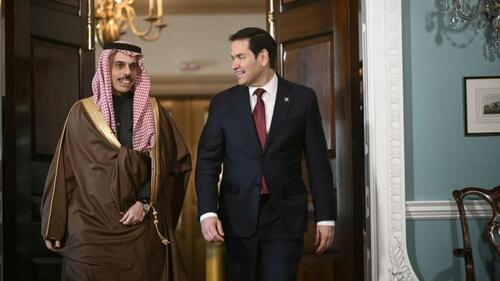 US Secretary of State Marco Rubio meets with Saudi FM Prince Faisal bin Farhan at the State Department in Washington, on April 9, 2025. AFP
US Secretary of State Marco Rubio meets with Saudi FM Prince Faisal bin Farhan at the State Department in Washington, on April 9, 2025. AFP
At least 1,115 executions have been carried out under the crown prince's rule between June 21, 2017 and October 9, 2024.
Additionally, according to Reprieve, Saudi Arabia has repeatedly lied to the UN about its use of the death penalty.
-
Site: AsiaNews.itAs the Prefect of the Dicastery for the Clergy, Cardinal Lazzaro You Heung-sik holds one of the most influential roles in the Roman Curia. His life journey—from a war-torn Korea to the corridors of the Vatican—offers insight into the values, complexities, and vision shaping today's Asian Catholic leadership.
-
Site: AsiaNews.itArchbishop of Jakarta since 2010, now approaching 75, he welcomed Pope Francis to the country on his trip a few months ago.Among the initiatives he has promoted is a diocesan fund that supports the sick and bereaved families: 'Concrete moments in which to show ourselves to be brothers and sisters to all.'
-
Site: Novus Motus LiturgicusDearest brethren, Christ suffered for us, leaving you an example that you should follow His steps; Who did no sin, neither was guile found in His mouth; Who, when He was reviled, did not revile. When He suffered, he threatened not, but delivered Himself to him that judged Him unjustly; Who His own self bore our sins in His body upon the tree: that we, being dead to sins, should live to justice: Gregory DiPippohttp://www.blogger.com/profile/13295638279418781125noreply@blogger.com0
-
Site: PaulCraigRoberts.org
Karen Kwiatkowski Wonders How Much Longer Americans Will
Be Content for 9 Million Israelis to Totally Dominate the UShttps://www.lewrockwell.com/2025/05/karen-kwiatkowski/war-in-washington/
-
Site: PaulCraigRoberts.org
This is US Representatie Marjorie Taylor Greene: the Firebrand Republican Member of the house:
https://x.com/RepMTG/status/1918351681374581181
She says Trump is losing support.
It does seem that Trump’s peace promises have been elbowed off the agenda by Israel and the US armaments industry.
Washington has approved a $310 million F-16 support package for Ukraine, and Trump threatens more sanctions for Russia. https://www.rt.com/news/616689-us-approves-f16-support-ukraine/ It appears that the deal Trump wants does not coincide with the one Zelensky wants or the one that Putin wants. Will coercion take the place of negotiation?
The peace negotiations with Iran seem even less favorable. The terms specified by the US Secretary of State are unacceptable to Iran, and Washington has returned to war threats.
The analysis below is from a realist, not a narrative supporter, and it is grim. Make of it what you will:
Following the last (third) meeting between the US and Iran held a week ago, a “senior US official” reported that “The talks in Muscat were positive and productive. There is still much to do, but further progress was made on getting to a deal.” The Omani Foreign Minister also stated, “U.S-Iran talks today identified a shared aspiration to reach agreement based on mutual respect and enduring commitments. Core principles, objectives and technical concerns were all addressed.” My impression was that the talks were focusing on the same principles that the previous JPCOA agreement (which Trump abrogated) had embodied, which would have resulted in Iran forgoing the production of weapons-grade uranium (and the elimination of Iran’s current stockpile of 60% enriched uranium).
Statements made on May 2 by US Secretary of State Marco Rubio (copied below) reveal that, once again, the negotiating position of the US on Iran appears to have radically changed. The US has reinstated the Zionist list of demands that go far beyond limiting the production of weapons-grade uranium: Iran must (1) eliminate all capacity to enrich uranium (which it is allowed to do under the Nuclear Non-Proliferation Treaty, for uses in its civilian nuclear energy program), (2), eliminate its arsenal of long-range ballistic missiles (which are essential for Iran’s defense against Israel et al), and (3) stop all support of the Houthis in Yemen.
Rubi’s comments came as the fourth round of nuclear negotiations between Tehran and Washington, set to take place in Rome today (May 3), were postponed indefinitely. An Iranian official cited by Reuters said a new date for the talks would be set “depending on the US approach.” Iran has been quite clear that its uranium enrichment and its defense capabilities are non-negotiable. In other words, the latest US demands — which have resulted in the cancellation of further talks with Iran — are designed to be unacceptable and create the excuse to launch major attacks on Iranian nuclear and military facilities.
When he took office, Trump had the opportunity to immediately stop the flow of munitions, arms, and money to both Israel and Ukraine, which would have quickly ended the ability of both nations to continue supplying their respective armed forces, bringing a relatively quick end to the Ukraine War and the ethnic cleansing in Gaza. But Trump quickly abandoned his campaign promises to avoid entangling the US in any more foreign wars, which for decades have wasted trillions of dollars that could have been used to rebuild the US crumbling infrastructure and de-industrialized economy.
Trump instead accepted the Zionist neocon demands that the US continue its unconditional support of the ongoing Israeli slaughter and starvation of the Palestinians, and as a result, he has started a new war with Yemen, because — in defense of the Palestinians — the Yemeni Houthis dared to blockade all ship traffic going to and from Israel in the Red Sea. Under Trump, the US “Operation Rough Rider Protect Genocide” has carried out 1000 bombing raids against Yemen, which have killed hundreds of Yemeni civilians but have failed to break the blockade.
Considering the abject failure of the current military attacks on the Houthis, it makes absolutely no military sense for the US to launch a similar air campaign against Iran — a nation like Yemen that has spent decades preparing for just such an attack. Iran has a multitude of deeply buried missile cities, which include underground military bases and silos where Iran stores and deploys its missile arsenal. These missile cities are strategically located throughout Iran, and they include large, deeply buried underground tunnels, storage facilities, and launch silos for missiles. The US and Israel may know the location of many of these sites (especially the nuclear sites), but they cannot use conventional weapons to effectively destroy them.
Only an attack with nuclear weapons has the capacity to thoroughly destroy nuclear facilities that are buried deep inside a mountain or underground (this would not assure the destruction of the 60% enriched uranium supplies that Iran has already produced, as it may have already been moved elsewhere). The US is highly unlikely to attack Iran with nuclear weapons.
But would the current Israeli leadership shy away from using nuclear weapons against the Iranian nuclear facilities? Israel has already had no qualms about killing hundreds of thousands of Palestinians. Israel has several hundred nuclear weapons that can be “delivered” by planes, ballistic missiles, and cruise missiles — including submarine-launched cruise missiles carried by their 4 German diesel subs. An Israeli nuclear strike against Iran would trigger a full-scale Iranian attack on Israel, and all-out war would ensue.
Even if a US-Israeli attack on Iran was initially limited to the use of conventional non-nuclear weapons, there has been public discussion that such an attack would target Iranian political and military leaders. This type of attack would involve hitting Iranian cities as well as Iranian military bases. It would be a huge strike, and one that would almost guarantee that Iran would retaliate against US bases in the Middle East, US naval forces that participated in the attack — as well as against Israeli military bases, military leaders, and Israeli political leaders. The three largest cities of Israel (Jerusalem, Tel Aviv, and Haifa, which hold at least 20% of the total population of Israel) would be struck. After such an attack, I think Israel would retaliate with nuclear weapons against both civilian and military targets in Iran.
In other words, regardless of whether or not the initial strike on Iran would include nuclear weapons, it is almost inevitable that nuclear weapons would be used in the war that would result.
The Israeli propaganda is that Iranian air defenses have already been destroyed, making a large air attack against Iran quite feasible (a “cakewalk”). I think this is a false assumption, created by Israel to help draw the Americans into a joint attack. The idea is that once the air defenses are completely taken out, and the Iranian political and military leaders have been killed, the scenario recently seen in Syria (with the utter collapse of the Assad government) will play out again, this time in Iran. The incredible hubris of the Trump White House seems to lend itself to accepting this idea. The latest change in the US “negotiating” position via Iran suggests that Trump will succumb to the Zionist pressure to wage war against Iran.
If the reports from Alastair Crooke are correct, the Russian and Iranian air defense systems are in good working order and actually fended off the last attempt by Israel to take them out (in October 2024). If this is the case, I think the US and Israeli forces will suffer major losses if they send their air forces to attack Iran military and nuclear sites. Russia will be providing real-time intelligence to Iran; the Russian air base in Tartus, Syria, has S-400 radar systems that can detect an Israeli attack; Iran also has an over-the-horizon radar system that could provide an early warning of an aerial attack. Will the US be able to effectively pierce Russian and Iranian air defense systems? If not, then I suspect that under such circumstances, as the desperation levels of the attackers increase, the use of nuclear weapons becomes even more likely.
Let us hope that the reports copied below — in which the US Secretary of State Rubio has announced the latest US demands on Iran — are simply one more flip flop in Trump’s bizarre manner of threatening extreme action against any nation that doesn’t follow his latest diktats. If not, then all Hell is going to break loose in the Middle East sometime in the near future.
Rubio says Iran must abandon its uranium enrichment program
By Vaughn Cockayne – The Washington Times – Friday, May 2, 2025
A version of this story appeared in the daily Threat Status newsletter from The Washington Times. Click here to receive Threat Status delivered directly to your inbox each weekday.
Secretary of State Marco Rubio said Iran must “walk away” from all nuclear enrichment and ballistic missile programs, taking a public hard line as negotiations between Washington and Tehran continue.
In an interview with Fox News on Thursday, Mr. Rubio said there can be no long-lasting deal between the U.S and Iran if Tehran is unwilling to give up several initiatives.
“They have to walk away from sponsoring terrorists, they have to walk away from helping the Houthis, they have to walk away from building long-range missiles that have no purpose to exist other than having nuclear weapons, and they have to walk away from enrichment,” Mr. Rubio said Thursday
Mr. Rubio went on to suggest that Iran could import enriched uranium, so it would not have to abandon its domestic commercial nuclear industry completely. He added that the U.S. must be allowed to inspect Iranian nuclear and military facilities regularly.
Iran has long maintained that its nuclear enrichment program is for civilian and commercial use and has denied seeking a nuclear weapon. Its foreign ministers have asserted repeatedly that it will not give up its nuclear sovereignty during negotiations.
Nuclear watchdogs and U.S. officials say Iran’s level of nuclear enrichment is far higher than what would be necessary for purely civilian purposes. During the past month’s talks, some have floated the possibility of Iran transferring ownership of its enriched uranium to a foreign ally like Russia. Iran’s foreign ministry has publicly declined to accept such an offer.
“If you have the ability to enrich at 3.67%, it only takes a few weeks to get to 20%, then 60% and then the 80 and 90% that you need for a weapon,” Mr. Rubio said Thursday.
Mr. Rubio’s comments on Thursday detail the deep divisions still in play during negotiations. The U.S. seeks limits on Iran’s nuclear enrichment and ballistic missile program in exchange for sanctions relief.
However, President Trump has repeatedly said that if Tehran and Washington are unable to come to a deal, he would launch bombing raids on Iran with Israel’s help. Secretary of Defense Pete Hegseth issued a firm warning to Iran on Thursday, urging the Islamic Republic to halt its funding of Houthi rebels in Yemen.
Negotiators were expected to meet again in Rome on Saturday, but Omani mediators announced Thursday that talks had been postponed over logistical issues.
Iran must ‘walk away’ from all uranium enrichment, Rubio says
https://www.reuters.com/world/iran-must-walk-away-all-uranium-enrichment-rubio-says-2025-05-02/
May 2 (Reuters) – Iran has to ‘walk away’ from uranium enrichment and long-range missile development and it should allow Americans to inspect its facilities, U.S. Secretary of State Marco Rubio said on Thursday as a round of nuclear talks was postponed.
Rubio’s comments underscore the major remaining divisions in talks between the countries to resolve the long-running dispute over Iran’s nuclear programme, with U.S. President Donald Trump threatening to bomb Iran if there is no agreement.
“They have to walk away from sponsoring terrorists, they have to walk away from helping the Houthis (in Yemen), they have to walk away from building long-range missiles that have no purpose to exist other than having nuclear weapons, and they have to walk away from enrichment,” Rubio said in an interview on the Hannity programme on Fox News. Iran has repeatedly said it will not give up its missile programme or its uranium enrichment – a process used to make fuel for nuclear power plants but which can also yield material for an atomic warhead.
On Thursday a senior Iranian official told Reuters that the scheduled fourth round of talks due to take place in Rome on Saturday had been postponed and that a new date would be set “depending on the U.S. approach”.
-
Site: Zero HedgeHope For The UK? Reform Party Dominates Uniparty In Sweeping Local ElectionsTyler Durden Sun, 05/04/2025 - 07:35
In July of 2024, the Labour Party and Kier Starmer won general elections with the British public seeking to punish conservatives for not following through on their Brexit promises and stopping mass open immigration. One of the primary reasons why the Brexit movement was a success was because it attempted to address growing concerns among UK natives that their ties to the European Union had trapped them in a prison of progressive politics including carbon taxation, declining personal freedom, economic crisis and mass immigration from the third world.
Starmer would take his narrow win and go on to expand the very same policies that UK citizens voted against. He helped to flood Britain with migrants, primarily from Islamic regions, and as the public took to the internet and the streets to complain, he enforced draconian censorship laws to silence them.
It's amazing how quickly things can change in less than a year. In 2024, the Reform Party won around 14% of the vote share. This week in local elections they won 30% of the vote share, crushing Labour and the Conservatives and winning 677 council seats.
Labour lost 187 seats and Conservatives were stunned with a 674 seat loss. Nigel Farage has hailed Reform UK's gains in Thursday's elections as "unprecedented" and "the end of two-party politics". The party also won two mayoral races and added a fifth MP to its ranks in the Runcorn.
UK voters are sending a clear message to the political elites that their progressive agenda will no longer be tolerated.
Local council elections are held every four years (though not all seats come up for a vote at the same time), and are designed to fill local government posts dealing with issues from housing to potholes. The Reform Party upset in council seats is a sign that Farage is on his way to becoming Prime Minister.
Conservatives and Labour, long considered a "Uniparty" alliance that never actually changes the system while they pretend to be opposed, has consistently referred to Reform as an "extremist" or "far-right" organization (much like MAGA in the US). Writing in The Times, Keir Starmer argued that the lesson learned from the elections was not that the country needed "ideological zealotry", but that the government needs to "crank up the pace on giving people the country they are crying out for..."
Labour members claim that their losses are due to the sluggish economy and cuts to social welfare policies, such as cuts in winter fuel payments to pensioners. In other words, their solution is to buy off voters with more benefits. They continue to pretend as if the mass immigration problem, high taxes and censorship are not factors.
Nigel Farage, though opposed to mass immigration programs, has not come out to fully endorse deportations, which is what helped give Donald Trump his landslide White House win in the US. Some critics say Farage does not go far enough in his solutions for saving the country. Only time will tell, but there are certainly visible cracks in the armor of the uniparty system and this may portend much needed changes in the UK and perhaps the rest of Europe in the near future.
-
Site: PaulCraigRoberts.org
The Bell Tolls for All White Gentile Ethnicities
Paul Craig Roberts
The Vice President and Secretary of State of the United States have called attention to the tyrannical behavior of the current German government, a corrupt anti-democratic government, controlled by Israel, that is holding on to power by designating its rival, AfD, the rapidly growing second largest party as “extremist.” Recent polls indicate that the AfD has pulled even and perhaps a bit ahead of the government that is trying to suppress it.
By applying the “extremist” label to its rival, the government gives itself the power to use its spy agencies to keep the AfD under surveillance. This permits the current corrupt government to know in advance the AfD’s electoral plans while demonizing the AfD as so extreme that it must remain under surveillance.
On what grounds is the AfD designated extremist? The German Domestic Security Service BfV explains: The AfD represents ethnic Germans. Representing “people based on ethnicity and descent” disregards the human dignity of immigrant-invaders and is “incompatible with the democratic basic order.” https://www.rt.com/news/616710-german-fm-response-rubio-afd-tyranny/
Here we have it stated clearly just as Jean Raspail put it in The Camp of the Saints. It is anti-democratic for a government to represent the citizens from whose ethnicity the name of the country is derived. Democracy requires representation of those who entered the country illegally or under false pretenses. All government enforcement measures are then directed against the ethnic citizens who are coerced to accept the invasion. As Jean Raspail showed, this is a formula for the extinction of white ethnicities. President Trump’s effort to restore power to ethnic Americans is being blocked by an anti-American judicial system that represents immigrant-invaders, not American citizens.
Hanne Herland of the Herland Report tells us accurately that this is the situation all over Western Europe, the UK and Ireland:
“In Europe, non-Western immigrants were given the victim card, and the current discrimination against the indigenous native Europeans by their own leaders began. Instead of listening to their needs, they demonized their views and attacked their own populations.
“Europeans were told to step aside and allow immigrants to behave however rudely they wanted, since they came from poor countries and ‘didn’t know any better.’ They were to be excused from law-breaking behavior such as violent rapes, murders or entering the country illegally.” In other words, the immigrant-invaders weren’t civilized sufficiently to know any better, and it is all the fault of racist white ethnicities. https://hannenabintuherland.com/currentaffairs/how-racism-against-whites-was-legitimized-by-marxist-multiculturalism/
What representing immigrant-invaders means in the EU is the loose enforcement, if any enforcement at all, of criminal and rape laws against immigrant-invaders,
Holding immigrant-invaders accountable would be racism, like what the Germans did to Jews. In effect, what is happening all over Europe and in Britain is that immigrant-invaders are becoming overlords over the ethnicities that comprise the former nations, now towers of babel.
So, on top of their Israeli overlord, Europeans have immigrant-invaders as another overload.
What a joke that Europeans and British and Irish are “free people.” They are the most enslaved in history. Even their tongues have been cut out. They cannot speak.
The entire Western World is a dead man walking. Every person who rises to the defense of Western civilization is demonized, arrested, fired, dismissed from his university, framed in a false prosecution and imprisoned.
The Insouciant West was insouciant for too long, It has lost its life.
-
Site: Vox Cantoris
-
Site: Mises InstituteWe eliminate the main problem that plagued "limited government.": we are relying on the government — a monopoly agency — to police itself.
-
Site: Zero HedgeFive Benefits That The US Would Reap From Coercing Ukraine Into More Concessions To RussiaTyler Durden Sun, 05/04/2025 - 07:00
Authored by Andrew Korybko via substack,
Failure to do so risks another “forever war”, an Afghan-like debacle for the US, or World War III.
Russian Foreign Minister Sergey Lavrov’s recent reaffirmation of his country’s goals in the Ukrainian Conflict signal that the Kremlin regards the US’ reportedly finalized peace plan as unacceptable. Ukraine must withdraw from the entirety of the disputed territories, at least partially demilitarize and denazify, and Western troops mustn’t deploy there afterwards for Russia to agree to a ceasefire.
Here are the five benefits that the US would reap from coercing Ukraine into these and other concessions to Russia:
1. Swiftly & Sustainably End The Ukrainian Conflict
Another “forever war” or Afghan-like debacle would be averted upon swiftly ending the conflict via these means, which would lead to a sustainable peace since Russia’s security interests would be ensured. The Trump Administration thus wouldn’t have to worry about getting dragged into another quagmire via mission creep if peace talks collapse or having its reputation tarnished by a defeat. Coercing Ukraine into the required compromises for ending the conflict would be an effective and face-saving way to move on.
2. Shock NATO Into Spending 5% Of GDP On Defense
NATO’s Western European members are expected to procrastinate on Trump’s demand that they spend 5% of GDP on defense unless they’re shocked by the proposed US-coerced Ukrainian concessions. They’d jolt them into prioritizing this without further delay due to their paranoid fear of a Russian invasion. This would in turn lead to Western Europe finally shouldering more burdens for its own security and correspondingly complementing its Central European members’ existing efforts in this regard.
3. Turn Central Europe Into The EU’s Center Of Gravity
In that scenario, the Central European countries’ role as NATO’s frontline states would be reinforced, which could lead to them becoming the EU’s center of gravity if the US helps the Polish-led “Three Seas Initiative” implement its dual military-economic integration projects. These anti-Russian countries are expected to cling even closer to the US after the Ukrainian Conflict ends, thus enabling the US to drive a wedge between Western Europe and Russia afterwards, thereby perpetuating US influence over the EU.
4. Enter Into A “No-Limits” Resource Partnership With Russia
Expanding the nascent Russian-US “New Détente” into a “no-limits” resource partnership in the post-conflict era would lead to them jointly managing the global oil and gas industries while also unlocking valuable rare earth opportunities. Potential US ownership of Russia’s Nord Stream and trans-Ukrainian gas pipelines to Europe could further perpetuate US influence over the bloc as well as deter Russia from violating the Ukrainian peace deal. The economic and strategic benefits would truly be unprecedented.
5. Accelerate The “Pivot (Back) To Asia” For Containing China
Quickly extricating the US from the financial and military commitments that the Ukrainian Conflict entails would accelerate its “Pivot (back) to Asia” for containing China and comprehensively add to the pressure being put upon the People’s Republic by Trump’s global trade war/“economic revolution”. This outcome would advance the US’ grand strategic goal of reshaping the emerging Multipolar World Order more to its liking within the realistic limits posed by the global systemic transition.
These five benefits would be lost if the US doesn’t soon coerce Ukraine into more concessions to Russia.
The conflict could continue indefinitely in that event, during which time the US might either largely abandon Ukraine and thus cede its influence over the EU while accepting an historic defeat or punish Russia by “escalating to de-escalate” at the risk of World War III, neither of which is preferable.
The best way to end what Trump rightly described as “Biden’s war” is therefore through the proposed means.
-
Site: Catholic Herald
Both geographically and historically, the region of Andalusia in Spain is a crossroads of humanity. Bordering both the Atlantic Ocean and the Mediterranean Sea, it’s physically part of Europe but for six centuries it was known as al-Andalus and formed a key outpost of the Islamic world.
It’s perhaps fitting that Andalusia therefore would give birth to a papal candidate who seems to unify three different worlds in his own biography: 72-year-old Cardinal Cristóbal López Romero, who currently serves as the Archbishop of Rabat in North Africa and who’s also spent considerable portions of his career in Paraguay and Bolivia.
It’s not, by the way, as if López is campaigning for the papacy; he recently quipped that if he sees any serious danger of that happening, he’ll start running from Rome and not stop until he hits Sicily. He also told a Spanish journalist that anyone desiring to be pope has problems, either of the head or the heart.
Whether he wants it or not, however, many people, including not a few of his fellow cardinals, can’t help looking at the bearded, jovial Salesian, who exudes an informal style coupled with a deep intelligence, and seeing a potential Successor of Peter.
 Spanish cardinal Cristóbal López Romero during a ceremony inside St Peter’s Basilica following the procession of the late Pope’s coffin from the chapel of Santa Marta to St Peter’s Basilica, Vatican, 23 April 2025. (Photo by TIZIANA FABI/AFP via Getty Images.)
Spanish cardinal Cristóbal López Romero during a ceremony inside St Peter’s Basilica following the procession of the late Pope’s coffin from the chapel of Santa Marta to St Peter’s Basilica, Vatican, 23 April 2025. (Photo by TIZIANA FABI/AFP via Getty Images.)López was just twelve years old when he decided to enter the Salesians of Don Bosco, the second-largest men’s religious order in the Catholic Church after the Jesuits, which is known for its doctrinal orthodoxy, its pastoral work with youth, and its commitment to schools. He professed his first vows at the age of 16 in 1968, during a period in Europe marked by student riots in which the idea of a religious vocation probably seemed a deeply counter-cultural act.
López was ordained to the priesthood in 1979 following studies at the diocesan seminary in Barcelona, and three years later he graduated with a degree in information science – with, let the record reflect, a specialisation in journalism – from the Autonomous University of Barcelona.
Not long afterwards, López began the missionary journeys that would form the heart of his priesthood and his episcopal service.
In 1984 he departed for Paraguay, where he would remain for the next 20 years. Initially he was responsible for pastoral service with young people in the capital city of Asunción, eventually becoming the Salesian provincial director for work with youth. After two years as a parish priest in Asunción, López was then elected superior of the Salesians in Paraguay, which would not be the last time his leadership abilities came to the fore.
After finishing his term as superior and serving in a few other capacities for the Salesians in Paraguay, López’s life took a significant turn when he was asked to relocate to Morocco, where he ran a centre of formation in the city of Kénitra from 2003 to 2011. That experience put him in the country during the initial stirrings of the 2011-2012 Moroccan protests, part of the broader Arab Spring, which eventually led to the King conceding a series of constitutional reforms allowing for democratic elections.
Unusually, López was asked to go back to Latin America in 2011 to take up the post of superior of the Salesian province in Bolivia. Usually leadership would be elected from the members of the order already in the country, but clearly there were challenges in Bolivia that the community judged an outsider, someone with deep experience and a reputation for good judgement, was needed to address.
After three years, López returned to Morocco to become superior of the Salesian community there, his third leadership position in the community. He held that post until 2017, when Pope Francis named him the Archbishop of Rabat, making him the leader of the small Catholic community – less than one per cent of the national population of 31 million – in the overwhelmingly Muslim nation.
In the post, López became a major proponent and architect of interfaith dialogue, especially Christian/Muslim relations. In March 2019, he hosted Pope Francis on a two-day visit to celebrate the 800th anniversary of the historic encounter between St. Francis of Assisi and Sultan al-Malik al-Kamil during the Fifth Crusade. The pontiff was obviously appreciative, naming López a cardinal in a consistory he staged later that year in October.
During his term in Rabat, López has also emerged as an important voice on behalf of migrants and refugees who often set out from North Africa in search of a better life in Europe. During the course of a 2020 summit on the Mediterranean region in Bari, Italy, López insisted that immigration is “not a problem, but the consequence of many problems”.
“Poverty, wars, famines and climate change, an economic system which, as Pope Francis says, crushes entire populations: These are the problems that give rise to the migratory phenomenon,” he said.
López then offered a personal touch.
“I suffer a lot when, in Spain, some people, after having participated in the Eucharistic celebration, ask me, in a spiteful tone, not to send any more migrants from Morocco,” he said. “I ask myself: how is it possible to go to Mass and feel almost no compassion for the men, women and children who are suffering?”
López took part in Pope Francis’s two Synods of Bishops on Synodality, endorsing in general terms the push for a more dialogic and participatory Church, but he steered clear of taking positions on any of the controversial questions in those summits, from the ordination of women deacons to the blessing of persons involved in same-sex unions.
The case for López Romero?
To begin with, he has global appeal. Latin Americans tend to see him as one of their own, but he also has strong relationships with many African bishops, who, among other things, appreciate his pastoral care of migrants from their countries who arrive in Morocco trying to cross the Mediterranean into Europe.
The fact of being Salesian is reassuring to some voters, who see it as a sort of Good Housekeeping Seal of Approval that he won’t rock the boat too much. In that sense, a vote for López could be seen as a choice for the social and cultural portions of the Pope Francis agenda, but without the more doctrinally adventurous elements.
Further, at a time when many cardinals believe it’s important the next pope be a strong governor, especially in terms of Vatican administration, the varied experience López brings in leadership positions is seen as an asset.
Finally, López Romero is one of those rare figures who just seems to radiate contentment and serenity, a pastor with a keen sense of humour and also a deep spiritual streak. If the lead item on the job description of a pope is to the Church’s Missionary-in-Chief, then López might well strike many as an attractive option.
The case against?
The lack of a clear record on intra-ecclesial disputes may hurt López in some quarters. A few cardinal electors may feel they took a spin on a Latin American with a somewhat ambiguous platform twelve years ago, and they’re not really in the humour to do it again, even if the candidate was technically born in Spain.
In addition, López Romero’s résumé may come off to some electors as compelling and impressive, but perhaps a little too singular. The challenges of being the chief shepherd of Rabat, after all, no doubt are daunting, but how much real relationship do they bear to the ordinary circumstances of Catholic life in most of the rest of the world?
It may be a small point, but it’s also worth noting that it’s been almost 325 years since the Catholic Church was last led by a bearded pope – Innocent XII, who reigned from 1691 to 1700. On the other hand, Innocent was a reformer, fighting the practice of nepotism in Church offices, so perhaps López would bring the same spirit into the office.
In any event, his thick beard is all white – perhaps a nice bit of color coordination with the vestments he could be wearing in just a matter of days, should the choice fall upon the Man from Morocco.
Photo: New cardinal, Spanish prelate Cristobal Lopez Romero, following his appointment by the Pope, during an Ordinary Public Consistory for the creation of new cardinals, Vatican, 5 October 2019. (Photo by TIZIANA FABI/AFP via Getty Images.)

The post Papabile of the Day: Cardinal Cristóbal López Romero, ‘the Man from Morocco’ first appeared on Catholic Herald.
The post Papabile of the Day: Cardinal Cristóbal López Romero, ‘the Man from Morocco’ appeared first on Catholic Herald.
-
Site: RT - News
The country’s president, who pledged to attend despite pressure from the EU, was recently hospitalized with a heart condition
Serbian President Aleksandar Vucic is expected to attend Russia’s Victory Day celebrations, despite a recent health scare, Finance Minister and Deputy PM Sinisa Mali has said.
The May 9 parade on Moscow’s Red Square will mark the 80th anniversary of the Soviet victory over Nazi Germany in World War II. The Kremlin has invited a number of leaders from countries including Serbia, Slovakia, China, India, and Brazil. EU officials have warned member and candidate states against attending.
On Friday, Vucic abruptly ended a trip to the US after experiencing chest pain during a meeting in Florida, reportedly caused by high blood pressure. He had planned to meet with the Serbian diaspora and US President Donald Trump, but returned to Belgrade and was admitted to the Military Medical Academy, according to local broadcaster RTS. Doctors said the president “cannot be expected to return to his regular activities for several days.”
Speaking on Saturday, Mali said Vucic will likely follow through with the visit. “One thing I can say is, knowing him, considering that he is a man of his word, he gave his word that he would be there, I assume that he will keep his word. But I cannot tell you that at this moment.” Vucic was discharged from the hospital on Saturday.
Read more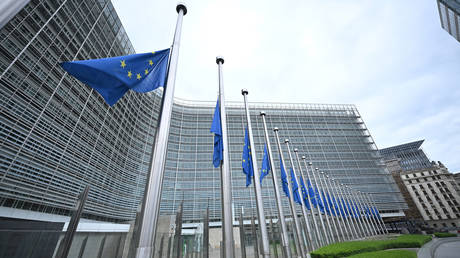 EU admits blackmailing Serbian leader over Moscow visit
EU admits blackmailing Serbian leader over Moscow visit
The Military Medical Academy confirmed that the president underwent cardiovascular and hematological diagnostics and is now in stable condition. Doctors ordered him to rest, and he has canceled all activities and obligations for the next few days.
Among the EU leaders invited to the event were Hungarian Prime Minister Viktor Orban and his Slovak counterpart, Robert Fico. Hungary declined the invitation, stating that the end of World War II represented “a bitter defeat” due to the country’s alliance with Nazi Germany. Fico has confirmed his attendance.
During a meeting with Vucic last month, EC Commissioner for Enlargement Marta Kos reportedly cautioned that his attendance would be held against Serbia’s EU bid. Despite the pressure, Vucic said he had not changed his decision to attend the event, where a unit of the Serbian Armed Forces will also take part. Russian President Vladimir Putin praised those who accepted the invitation, calling them courageous for attending despite pressure from Brussels.
READ MORE: Serbian president cancels meetings in Washington – media
-
Site: RT - News
The previous vote was annulled on grounds of alleged “Russian interference,” with the leading candidate barred from running again
Romania is holding a rerun of its presidential election on Sunday after the previous vote was annulled on grounds of alleged Russian interference and electoral violations. Moscow has denied all claims of interference.
The annulled election in late November saw independent right-wing candidate Calin Georgescu, known for his NATO-sceptic stance, unexpectedly prevail in the first round with 23% of the vote. However, the Constitutional Court later invalidated the results, citing electoral “irregularities.” The country’s officials claimed that the candidate’s campaign had utilized undeclared funds, and that Russia was behind “hybrid” attacks, including in the cyber realm.
In March, Georgescu was barred by the Central Electoral Bureau from running again, citing his alleged “anti-democratic” and “extremist” stance as well as a failure to comply with electoral procedures.
Read more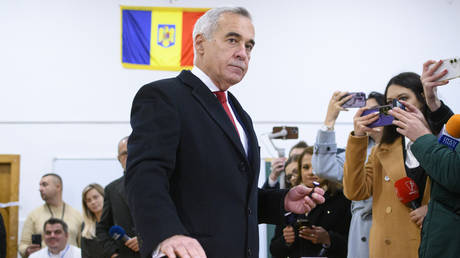 ‘Romania under tyranny’: How EU-sceptic Calin Georgescu was barred from new elections
‘Romania under tyranny’: How EU-sceptic Calin Georgescu was barred from new elections
In the current election, a total of 11 candidates are competing for the presidential post. The key contenders include George Simion, the leader of the far-right Alliance for the Union of Romanians (AUR), who is known for his opposition to the EU, and criticism of military support to Ukraine. He is leading the polls with approximately 30% support.
Other prominent candidates include Crin Antonescu, representing the governing Social-Democrat and National Liberal coalition, and Nicusor Dan, the mayor of Bucharest, both of whom support pro-EU agendas.
If no candidate wins an absolute majority, a run-off between the two leading candidates will be held on May 18.
Ahead of the rerun, meanwhile, Romanian detained RT journalist Chay Bowes, who had traveled to Bucharest from Dublin, Ireland, to cover the election. According to the reporter, he was presented with a paper – of which he was not given a copy – alleging that he was “a threat to the security of the state” and therefore should be deported. Bowes, a EU citizen, has insisted that he entered Romania “completely legally… to do [his] job.”
Commenting on the detention, Russian Foreign Ministry spokeswoman Maria Zakharova said that the Romanian election had turned into a “meme.” She added that “the situation around the election in Romania is so scandalous. It’s so dead-ended and it discredits the level of that pseudo democracy in Romania.”
-
Site: RT - News
The previous vote was annulled on grounds of alleged “Russian interference,” with the leading candidate barred from running again
Romania is holding a rerun of its presidential election on Sunday after the previous vote was annulled on grounds of alleged Russian interference and electoral violations. Moscow has denied all claims of interference.
The annulled election in late November saw independent right-wing candidate Calin Georgescu, known for his NATO-sceptic stance, unexpectedly prevail in the first round with 23% of the vote. However, the Constitutional Court later invalidated the results, citing electoral “irregularities.” The country’s officials claimed that the candidate’s campaign had utilized undeclared funds, and that Russia was behind “hybrid” attacks, including in the cyber realm.
In March, Georgescu was barred by the Central Electoral Bureau from running again, citing his alleged “anti-democratic” and “extremist” stance as well as a failure to comply with electoral procedures.
Read more ‘Romania under tyranny’: How EU-sceptic Calin Georgescu was barred from new elections
‘Romania under tyranny’: How EU-sceptic Calin Georgescu was barred from new elections
In the current election, a total of 11 candidates are competing for the presidential post. The key contenders include George Simion, the leader of the far-right Alliance for the Union of Romanians (AUR), who is known for his opposition to the EU, and criticism of military support to Ukraine. He is leading the polls with approximately 30% support.
Other prominent candidates include Crin Antonescu, representing the governing Social-Democrat and National Liberal coalition, and Nicusor Dan, the mayor of Bucharest, both of whom support pro-EU agendas.
If no candidate wins an absolute majority, a run-off between the two leading candidates will be held on May 18.
Ahead of the rerun, meanwhile, Romanian detained RT journalist Chay Bowes, who had traveled to Bucharest from Dublin, Ireland, to cover the election. According to the reporter, he was presented with a paper – of which he was not given a copy – alleging that he was “a threat to the security of the state” and therefore should be deported. Bowes, a EU citizen, has insisted that he entered Romania “completely legally… to do [his] job.”
Commenting on the detention, Russian Foreign Ministry spokeswoman Maria Zakharova said that the Romanian election had turned into a “meme.” She added that “the situation around the election in Romania is so scandalous. It’s so dead-ended and it discredits the level of that pseudo democracy in Romania.”
-
Site: Catholic Herald
There is an old idiom at universities in the United States: “Sophomores act sophomoric.”
It means young people in their late teens often do stupid things, usually because they think they are funny. Often, members of a college Republicans’ group or the university’s Democrats’ group will say or do things with the intention of outraging their opponents, all in “good fun”. People expect the kids grow out of it, it is hoped, before they graduate.
In today’s world, with new technologies mixed with social media, one could excuse a 19-year-old trying to get a laugh on the eve of a big event like a papal conclave – say by using AI to mock up an image of himself as the next pope.
One questions what reason a 78-year-old man may have to do it, though, especially if he is the President of the United States. It is more perplexing if he then puts it on the official White House pages on X and Instagram. But that’s what Donald Trump did.
Trump’s original picture was published on his own platform, Truth Social, which was then shared on the White House’s social media sites.
But still, why do something like this less than two weeks after Pope Francis died and during the official nine-day mourning period of the Catholic Church?
The late pontiff had a somewhat complicated relationship with Trump, disagreeing with him on immigration and refugees. Francis even once said a “man is not Christian” if he had said some of things that Trump was reported to have said.
Was the US president really just acting like a college sophomore?
In any case, he managed to outrage lots of people, not all of them his natural political opponents.
The post has tens of thousands of replies, most of them negative. Both liberal and conservative Catholics have complained about it, calling it offensive and disrespectful.
US President’ Donald Trump’s picture on his official Truth Social social media account.At the same time, over 100,000 people have “liked” it.
In many ways, the picture doubled down on a previous statement Trump had made to reporters last week. “I’d like to be pope,” the president said. “That would be my number one choice.”
Trump was joking that time, and later said he had no preference in the election, before pointing out the cardinal in New York – Timothy Dolan – who “happens to be very good,” Trump said.
Trump’s AI picture stunt, however, may not be mere sophomoric banter, which also raises the question about the seemingly “jesting” pope-related comments made by JD Vance, the US vice-president.
On 2 May, Vice-President JD Vance – who converted to Catholicism in 2019 – responded on X to a post by someone speaking about the huge demands being made of US Secretary of State Marco Rubio, who happens to be a practising Catholic.
“I think he could take on a bit more. If only there was a job opening for a devout Catholic…” Vance wrote.
On 3 May , the vice-president then answered Bill Kristol, the US neoconservative writer and commentator, raising the question, “Hey, @JDVance, you fine with this disrespect and mocking [by Trump] of the Holy Father?”
Vance replied: “As a general rule, I’m fine with people telling jokes and not fine with people starting stupid wars that kill thousands of my countrymen.”
Of course, Vance had his own exchanges with Pope Francis.
A few months ago, Vance spoke to Fox News about his interpretation of the Christian teaching on the order of love, and how it related to the immigration question.
“There’s this old school – and I think it’s a very Christian – concept by the way, that you love your family, and then you love your neighbour, and then you love your community, then you love your fellow citizens in your own country, and then after that you can focus and prioritise the rest of the world,” the vice-president said.
Soon after, Pope Francis wrote a letter to the US government, refuting Vance, though the Pope’s letter wasn’t addressed to Vance personally.
“Christian love is not a concentric expansion of interests that little by little extend to other persons and groups,” the pontiff wrote.
“The true ordo amoris that must be promoted is that which we discover by meditating constantly on the parable of the ‘Good Samaritan’…by meditating on the love that builds a fraternity open to all, without exception,” Francis said.
This was then followed by Vance acknowledging the Pope’s criticisms at the National Catholic Prayer Breakfast in Washington, DC, at the end of February, before going to the Vatican at Easter, where he met with Francis the day before the pontiff died.
Trump has been president for less than four months and has had an interesting relationship with the Catholic Church in that short time.
He has had strong support from weekly-Mass-going Catholics, who praise the president for his actions against abortion and promotion of keeping transsexual persons from using same-sex facilities and school sports.
At the same time, he has faced opposition from many bishops for his attacks on immigrants and those seeking refuge in the United States, and especially for his mass deportations, to which there are legal challenges pending that observers say could produce a full-fledged constitutional crisis.
Trump could be just making a sophomoric joke, or he might be testing how far he can push the Catholic electorate while he is in office.
Photo: An AI picture of ‘Pope Donald Trump”]’ is put on the official White House page on X and Instagram. (Credit: Official White House X page.)

The post What on earth was Trump thinking posting a picture of himself as pope? first appeared on Catholic Herald.
The post What on earth was Trump thinking posting a picture of himself as pope? appeared first on Catholic Herald.
-
Site: RT - News
A Houthi official has confirmed the attack on Ben Gurion near Tel Aviv, claiming that the group has “no red lines” in its fight against Israel
Israel’s main airport was struck by a ballistic missile fired by Yemen’s Houthi rebels on Sunday morning. The missile hit a grove near an access road inside the perimeter of Ben Gurion Airport near Tel Aviv. Media reports suggest that at least six people were wounded.
The Israel Defense Forces (IDF) confirmed that it failed to intercept the missile despite several attempts.
“An impact was identified in the area of Ben Gurion Airport,” the IDF said in a post on Telegram. The Israeli Air Force is investigating the failure.The Houthis, who control western Yemen, including the capital and the port of Hodeidah, have launched a number of drones and missiles at commercial vessels passing through the Red Sea and at targets in Israel over the past year, aiming to pressure West Jerusalem over its military operation in Gaza. Israel launched the campaign following a deadly raid by the Palestinian militant group Hamas in October 2023. The Houthis said they would stop the attacks if Israel halts its operation in Gaza.
Israel has not launched strikes against Yemen in response to the Houthi attacks. The US, however, began air and naval strikes against Houthi targets in March, citing threats to Red Sea shipping. Last week, US President Donald Trump ordered the Pentagon to intensify strikes in Yemen and warned that the Houthis would be “completely annihilated” if they continued their attacks. The UK has also taken part in the strikes, with the Defense Ministry saying it targeted a Houthi-controlled facility.
US Defense Secretary Pete Hegseth accused Iran of arming the Houthis and warned there would be consequences. Tehran denied the claims. The US, however, announced sweeping sanctions on countries buying Iranian oil or petrochemicals on Thursday, citing Tehran’s alleged role in fueling conflict in the Middle East, among other things.
Russia has urged Washington to halt its strikes on Yemen. In a phone call in March with US Secretary of State Marco Rubio, Russian Foreign Minister Sergey Lavrov called for an immediate end to the use of force and urged all sides to engage in political dialogue.













